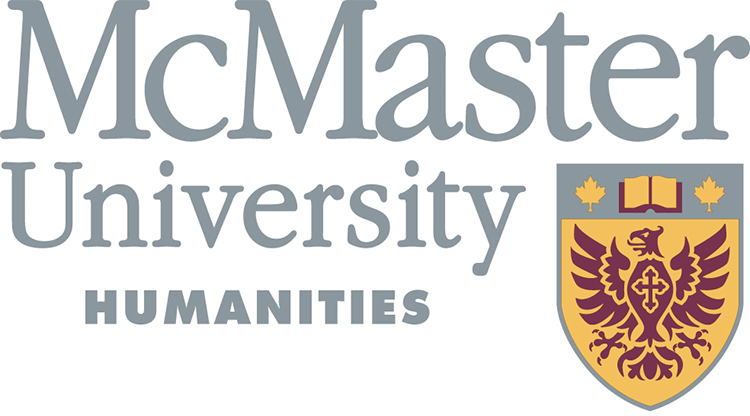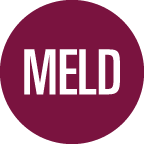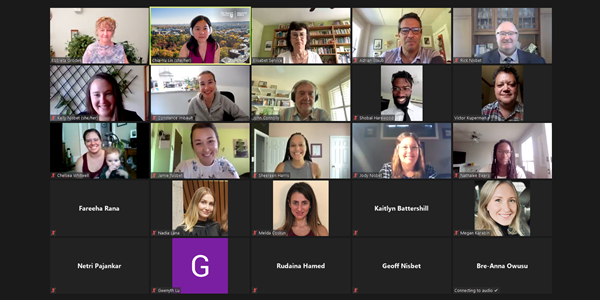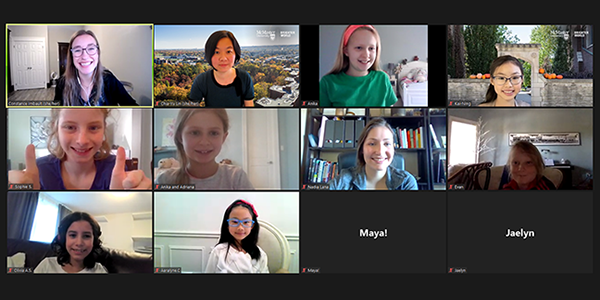ARiEAL
Annual Report 2021
Centre for Advanced Research in Experimental and Applied Linguistics
ARiEAL is grateful to the following key partners for their financial and resource support at McMaster University: Faculty of Humanities, Office of Vice-President Research, McMaster English Language Development Diploma Program, Department of Linguistics and Languages, School of Rehabilitation Science, McMaster School of Biomedical Engineering, and McMaster Industry Liaison Office.
Message from the Director
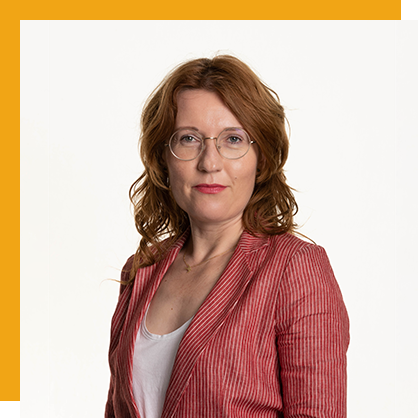
Director of ARiEAL Research Centre, Dr. Ivona Kučerová
(Photo Credit: Georgia Kirkos)
This is the first time I am composing the formal message for the ARiEAL annual report as the Centre’s new Director (as of July 2021), with the work reported here falling largely under the legacy of ARiEAL’s Founding Director, Dr. John Connolly. As I write, it is mid-April of 2022. Our community, affected by two years of COVID has faced additional challenges stemming from recent world events, primarily the new refugee exodus from Afghanistan and the war in Ukraine, the first major war in Europe since Yugoslavia. Despite their tragic dimension, these challenges have highlighted the resilient spirit of our community, and our ability to thrive and offer our help to others. As part of our response to these events, ARiEAL welcomed our first displaced Ukrainian doctoral student, brought onboard as a visiting student through a new ARiEAL initiative for International Visiting Scholars. This initiative was originally planned as a pilot program for summer 2022 and it was quickly adapted this spring to spur our efforts to support scholars from war zones. It has been a tremendous experience to have the privilege to work with and learn from the ARiEAL community over the last ten months in my new position. World events have even provided unprecedented research opportunities. As an example, Dr. Victor Kuperman’s Reading Lab has made important discoveries on effects of loneliness in the elderly in their Niagara Stories project, which has evolved and adapted to the very particular pandemic circumstances.
Despite the ongoing global challenges, for ARiEAL, the year 2021 was a year of research excellence, demonstrating our continuous efforts to produce world-class cognitive science of language research in an interdisciplinary setting. As our new mission and vision statements highlight, the strength and uniqueness of the Centre lies in its full life cycle of research, with mutually complementary fundamental and applied research.
In 2021, the Centre also underwent a 5-year external review. The review was a rigorous review process involving documentations of Centre goal and achievements, as well as stakeholder interviews. The external reviewers’ report commended ARiEAL on the quality of our research, the training provided by ARiEAL, and our connections to community-based research. The report also highlighted the fundamental role of ARiEAL trainees, both in advancing our research and in creating a more equitable and inclusive community.
As ARiEAL continues to evolve, considerations of equity, diversity, and inclusion drive our efforts. In addition to the new International Scholar Program, which is projected to welcome and support scholars from countries with emerging economies or war zones, the Centre will soon form a new Scientific Advisory Committee, the composition of which will be guided by a new set of recommendations made by the Centre’s committee on equity, diversity, and inclusion. Our ongoing work to engage local communities, including local Indigenous communities, in our research and research training is an integral part of the process.
Before concluding I would like to express my gratitude to the Centre’s manager, Chia-Yu Lin, who has been an incredible force behind much that has taken place in the Centre. I also would like to recognize the work of the ARiEAL’s Operation Team: trainee volunteers, working under Chia-Yu Lin’s supervision, who have relentlessly worked on creating additional learning opportunities and social events for trainees and other community members. My final thank-you goes to Dr. John Connolly who, as the Founding Director, made ARiEAL into the research space and community it is in 2022. Thank you, John!
Sincerely,
Dr. Ivona Kučerová
Director, ARiEAL Research Centre
Associate Professor, Department of Linguistics & Languages
Research Highlights
ARiEAL has a group of committed researchers, trainees, and staff who work diligently to create an enriched environment leading research in the field of language science. Highlighted below are the 2021 research activities from each of the laboratories led by ARiEAL researchers.
- The Syntax Lab
- MELD Programs & The MELD Bilingualism Lab
- Teaching and Learning Lab
- Neurotechnology & Neuroplasticity Lab
- Language, Memory and Brain Lab – EEG
- Language, Reading and Cognitive Neuroscience Lab
- The Reading Lab
- Imaging Research Centre
- The Phonetics Lab
- The Reilly Lab
- Language, Memory and Brain Lab – Behavioural
- The Turkstra Lab
- The Language and Working Memory Lab
- The MTBI Research Program
- The Performance Science Lab
The Syntax Lab
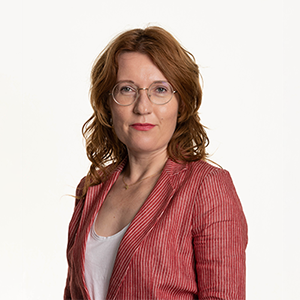
Director of the Syntax Lab, Dr. Ivona Kučerová (Photo Credit: Georgia Kirkos)
Dr. Ivona Kučerová, director of the Syntax Lab, investigates syntactic structures, with a specific focus on the syntax-semantics interface. More specifically, the lab is investigating if, and how semantic information can modulate syntactic derivation. Both traditional fieldwork and experimental methods are used to collect data from cross-linguistically diverse languages, including Indigenous languages of Canada. The goal of this research is to identify and model universal and language-specific structural properties of human languages. The primary focus of the work currently conducted in the Syntax Lab is on modelling features at the syntax-semantics interface.
In 2021, Alish Kocz completed his master’s degree and Kurtis Commanda received Mitacs funding to pursue an internship with the Kahawi Theatre. Dr. Kučerová and her trainees presented on underspecification of nominal functional categories in Slavic and Semitic at the Olomouc Generative Syntax Colloquium, and the research evidence on the remnant licensing and structural economy in VP ellipsis was presented at the Annual Meeting of Formal Approaches to Slavic Linguistics. Dr. Kučerová also delivered a keynote talk on neuter gender in Slavic at the 17th Annual Meeting of the Slavic Linguistics Society.
MELD Programs & The MELD Bilingualism Lab
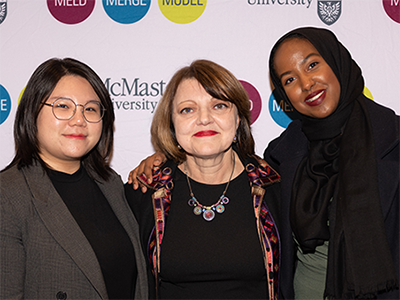
Associate Director of the ARiEAL Research Centre and Director of MELD programs and the Bilingualism Lab, Dr. Anna Moro (centre). Photographed together with Rita Jiang, Communications Associate of MELD Programs (left) and Yasmin Mohamed, Instructional Assistant of MELD Programs (right). (Photo Credit: Angela Herring-Lauzon)
The McMaster English Language Development (MELD) Programs and the MELD Bilingualism Lab are directed by Dr. Anna Moro. The MELD programs are intended for international students whose primary language is not English but who wish to improve their English proficiency to succeed in an English-speaking higher education environment. Since 2018, the MELD Programs have expanded their services from the MELD Diploma to also include McMaster English Readiness for Graduate Excellence (MERGE) and McMaster Office for the Development of English Language Learners (MODEL) to offer an even more comprehensive range of services to international students of all levels. Both MELD and MODEL incorporate problem-based learning and reflective practice in their curriculum, and were offered virtually during the pandemic.
The MELD Bilingualism Lab investigates the underlying linguistic mechanisms of bilingual phenomena and focuses on second language development. Together with postdoctoral researcher Dr. Daniel Schmidtke, results from a longitudinal eye movement study on the determinants of word-reading development in MELD cohorts were published in Reading Research Quarterly. Dr. Anna Moro, Dr. Daniel Schmidtke, and Sadaf Rahmanian also presented this longitudinal eye movement study at the Words in the World International Conference 2021.
Teaching and Learning Lab
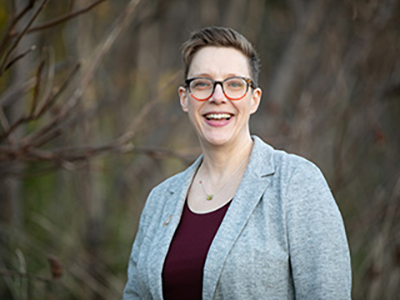
Dr. Anderson, Director of the Teaching and Learning Lab (Photo Credit: Lindsay Palmer)
Dr. Catherine Anderson, an Associate Professor in the Department of Linguistics and Languages, directs the Teaching and Learning Lab. The lab collaborates with undergraduate student partners and focuses on students’ experiences in a variety of undergraduate learning contexts. Dr. Anderson founded TILCoP Canada, the Teaching in Linguistics Community of Practice: a collective of faculty members from across Canada who meet regularly to share practices and resources since 2020. The group also created and produced Word to the Whys, a companion podcast for Intro Linguistics courses. Dr. Anderson also received funding from eCampusOntario to develop the second edition of the open-source textbook, Essentials of Linguistics.
Neurotechnology & Neuroplasticity Lab
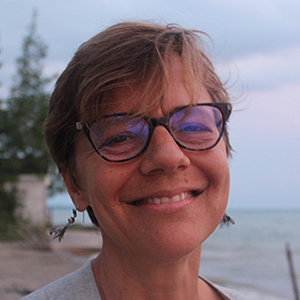
Director of the Neurotechnology & Neuroplasticity Lab, Dr. Sue Becker (Photo provided by Dr. Sue Becker)
Dr. Sue Becker is the director of the Neurotechnology & Neuroplasticity Lab, which uses computational modeling and empirical studies to investigate the neural bases of learning and memory and how it serves in episodic future thinking, planning and decision-making. Dr. Becker’s lab addresses research questions such as how the hippocampus codes episodic and spatial memories, and how stress, exercise, and neurofeedback affect hippocampal memory functions and intrinsic brain networks. This research can be applied to brain-computer-interfaces, sensory substitution for prosthetic limbs, and furthering our understanding of memory related disorders such as post-traumatic stress disorder.
In 2021, Saurabh Shaw and Leila Mousapour completed their doctoral and master’s degree, respectively. Mohammad Chaposhloo, a doctoral student, was awarded a MacData Fellowship in 2021. Additionally, trainees of Dr. Becker and Dr. Sonnadara worked on a project focusing on Ontario’s digital research infrastructures needs assessment and capacity building with funding support from Mitacs. In 2021, Dr. Becker wrote a book chapter on memory of space in the Oxford Handbook of Human Memory, and other publications in Consciousness and Cognition and Brain and Cognition.
Language, Memory and Brain Lab – EEG
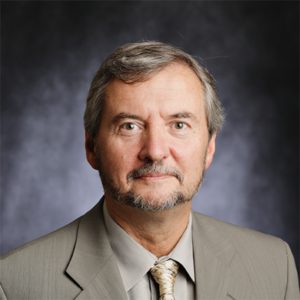
Co-director of the Language, Memory and Brain Lab, Dr. John Connolly (Photo Credit: Ron Scheffler)
The Language, Memory and Brain (LMB) Lab is co-directed by Drs. John Connolly and Elisabet Service. Dr. Connolly’s research focuses on using brain recordings (EEG) to investigate a range of neurocognitive phenomena including attention, memory, and language processing and the changes seen in brain injury and during recovery in conditions from concussion to coma. Dr. Connolly officially retired in 2021 and stepped down from the directorship of ARiEAL. He has since assumed the rank of Professor Emeritus at McMaster University and continued with an active research profile since his retirement.
In 2021, Kiersten Mangold completed her master’s degree and Dr. Paniz Tavakoli completed her postdoctoral fellowship at McMaster. Together with their trainees, Dr. Connolly collaborated with Dr. Noseworthy, and published their findings on the localization and identification of brain microstructural abnormalities in paediatric concussion in Frontiers in Neuroscience. Dr. Connolly was also an invited speaker at the University of Ghana where he discussed the electrophysiological assessment of neurocognitive function in health and pathology, and presented literature from acquired brain injury to post COVID syndrome. Dr. Connolly and the team continued their research work on determining the prognosis of comatose patients, and received additional funding with Dr. Paniz Tavakoli from the McMaster Arts Research Board to expand the coma study.
Language, Reading and Cognitive Neuroscience Lab
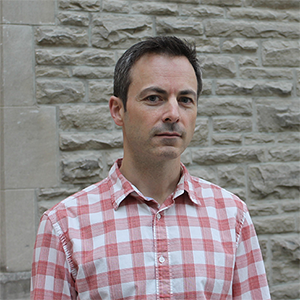
Director of the Language, Reading and Cognitive Neuroscience Lab, Dr. Marc Joanisse (Photo provided by Dr. Marc Joanisse)
Dr. Marc Joanisse directs the Language, Reading and Cognitive Neuroscience Lab which is housed in The University of Western Ontario’s Brain and Mind Institute. Dr. Joanisse’s research focuses on the cognitive and neural foundations of language and reading across the lifespan. This includes studying reading and language disorders in children, as well as language learning and processing in adults.
2021 was another fruitful year in peer-reviewed publications for Dr. Joanisse, his collaborators, and his trainees. Research results on resting-state functional connectivity and reading subskills in children and the reciprocal relations between reading skill and phonological awareness in children were disseminated in highly regarded journals, such as NeuroImage. Dr. Joanisse continues to work on advancing full literacy in a digital world as a part of his 7-year Social Sciences and Humanities Research Council (SSHRC) Partnership Grant.
The Reading Lab
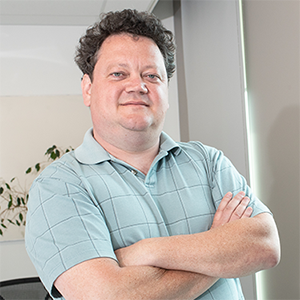
Director of the Reading Lab, Dr. Victor Kuperman (Photo Credit: JD Howell)
The Reading Lab, directed by Dr. Victor Kuperman, targets a range of areas in psycholinguistics and corpus linguistics with research foci such as the cognitive and socio-demographic predictors of literacy and reading comprehension in adults across languages. The Reading Lab’s research paradigms include eye-tracking, behavioural studies, large-scale norming studies, and quantitative analyses of written and spoken corpora.
In 2021, Kelly Nisbet completed her doctoral degree, and Nadia Lana completed her master’s degree and continued to doctoral training at the Reading Lab. Dr. Kuperman received an Insight Grant from the Social Sciences and Humanities Research Council (SSHRC) to investigate the impact of COVID-19 on reading comprehension in Canadian and US university students. Dr. Kuperman and his collaborators and trainees generated many impactful publications in journals such as Journal of Experimental Psychology: General and Behavior Research Methods. Dr. Kuperman was invited to present the evidence on their new eye tracking corpora internationally in 2021. To further the research on the linguistic markers of social isolation, the Reading Lab initiated an intergenerational writing program “Writing Across Generations” for older adults and high school students at YMCA Spokane, WA, USA. A similar program will be launched in the Niagara region in 2022.
Imaging Research Centre
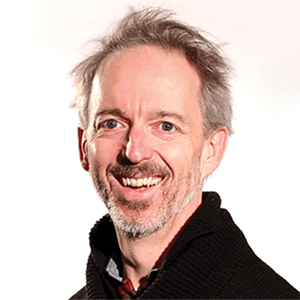
Director of the Imaging Research Centre, Dr. Michael Noseworthy
Dr. Michael Noseworthy is the director of Medical Imaging Physics and Engineering at the Imaging Research Centre at St. Joseph’s Healthcare, Hamilton. Dr. Noseworthy’s research interests focus on assessment of tissue microstructure and metabolism using multimodal medical imaging, such as the magnetic resonance imaging (MRI) and in vivo nuclear magnetic resonance (NMR) spectroscopy. His work considerably involves developing imaging hardware and software, and the research team works to study physiological problems and diseases using advanced medical imaging techniques.
Dr. Noseworthy and team published extensively in 2021, and their work appeared in the high impact journals, such as Journal of Science and Medicine in Sport and European Journal of Sport Science.
The Phonetics Lab
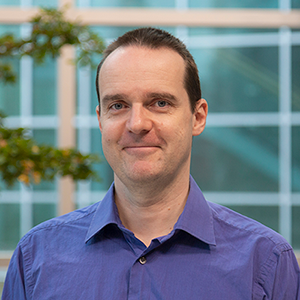
Director of the Phonetics Lab, Dr. Daniel Pape (Photo Credit: Colin Czerneda)
Dr. Daniel Pape is the director of the Phonetics Lab. His research examines experimental phonetics and speech acoustics, the link between speech production and speech perception, and the relationship between phonetics and neurolinguistics. Two new research streams were recently introduced at the Phonetics Lab. The first stream focuses on how different academic content, foreign accents and gender influence the accuracy of caption errors in academic online lectures and video conferences, a topic that was a focus of interest during the global pandemic. The second stream examines production and perception differences of bilingual speakers with different degrees of proficiency in their two languages, more specifically Canadian English/French speakers.
In 2021, Carla Weigel from the Phonetics Lab finished her master’s degree. Dr. Pape was a speaker at the 4th Phonetics and Phonology Conference in Europe (PaPE) where he presented his research on the perceptual cue weighting of intervocalic velar plosives in Canadian English. Together with his trainees, their work on applying automatic speech to text in academic settings for the deaf and hard of hearing was presented at the Current Research in Engineering, Science & Technology (CREST) Meeting in Hamilton, Ontario and at the LACUS conference in Toledo, Ohio. Dr. Pape also presented his collaborative work on Polish sibilant variability at the 50th Poznań Linguistic Meeting (PLM) in Poznań, Poland.
The Reilly Lab
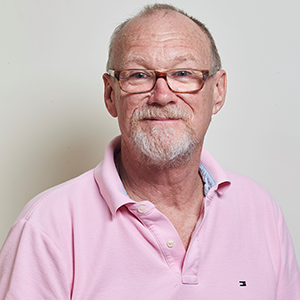
Director of the Reilly Lab, Dr. Jim Reilly (Photo provided by Dr. Jim Reilly)
Dr. Jim Reilly is an internationally renowned researcher in the field of signal processing. His work focuses on the application of machine learning and signal processing in relation to health-related problems, such as neuroscience. Dr. Reilly specializes in the development of machine learning algorithms, and the effort has been applied to improving diagnosis and treatment of psychiatric illness, prognosis for coma outcome, and assessment of infant motor movement relating to neurological deficit.
In the year of 2021, Dr. Reilly and collaborators published their work on the advanced signal processing methods for characterization of schizophrenia in IEEE Transactions on Biomedical Engineering and their machine learning approach in identifying self-harm and suicidal ideation among military and police Veterans in the Journal of Military, Veteran and Family Health. Dr. Reilly and his collaborators were also awarded a New Frontiers in Research Funding to study the use of artificial intelligence to predict suicide attempts among youth, using his expertise in machine learning.
Language, Memory and Brain Lab – Behavioural
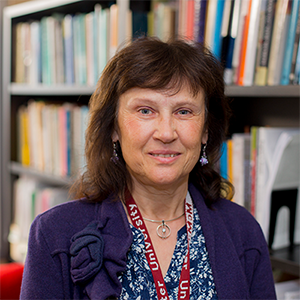
Co-director of the Language, Memory and Brain Lab, Dr. Elisabet Service (Photo Credit: Colin Czerneda)
The Language, Memory and Brain (LMB) Lab is co-directed by Drs. John Connolly and Elisabet Service. Dr. Service investigates the cognitive building blocks in language development and its relationship with working memory, alongside basic research on language acquisition, spoken word processing, and other related cognitive processes. Much of this work is then applied in investigations of language disorders including dyslexia.
In 2021, the results of Dr. Service’s collaborative project with the University of Helsinki on developmental language disorder were published in International Journal of Language Communication Disorders and Frontiers in Psychology, Language Sciences section. The findings suggests that that language disorder is associated with atypical development of short-term memory for temporal event order in both unilingual and bilingual children. Furthermore, order memory in atypical, but not in typical, language development is related to language abilities. This highlights nonverbal constraints on language development. Dr. Service also received funding from Social Sciences and Humanities Research Council (SSHRC) to investigate the effects of working in a second language on strategic thinking. Research by PhD candidate Fareeha Rana as well as former lab students Angie Lopez Ricote, Erin DeBorba and Meliha Horzum was presented at the annual conference of the Canadian Society for Brain, Behaviour and Cognitive Science (CSBBCS). The former lab students’ work as well as that of PhD candidate Bre-Anna Owusu was also presented at the conference of the Psychonomic Society.
The Turkstra Lab
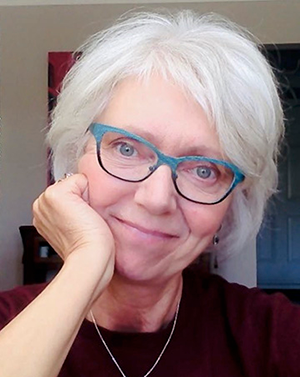
Director of the Turkstra Lab, Dr. Lyn Turkstra (Photo provided by Dr. Lyn Turkstra)
Dr. Lyn Turkstra heads the Turkstra Lab, which focuses on the links between cognitive function and social communication in individuals with traumatic brain injury (TBI). The Lab conducts both experimental and translational research on communication in adolescents and adults, and collaborates on development of practice standards to translate research findings into improved clinical practice and long-term patient outcomes.
In 2021, the lab’s main activities related to an ongoing National Institutes of Health (NIH) funded project that aims to develop technologies to support people with TBI in using social media. As part of this project, PhD student Lisa Kakonge, and University of Wisconsin-Madison postdoctoral fellow Hajin Lim completed virtual focus groups with individuals with TBI in the US and Canada to learn about their social media experiences. Undergraduate student, Catherine Bosyj, completed a scoping review of literature on cognitive factors in computer use, results of which will be applied to the tech development; and former master’s student Reihaneh Ahmadi completed analysis of her “think aloud” thesis, which aimed to learn how and why people with TBI used social media. The lab had other exciting student-initiated projects, including a study of sex- and gender-based differences in cognition by Sukhman Baath, and Imad Ali’s study showing how emojis influence interpretation of text messages. In 2021, Dr. Turkstra and colleagues published extensively in well-respected journals, such as Brain, American Journal of Speech Language Pathology, and International Journal of Language Communication Disorders.
The Language and Working Memory Lab
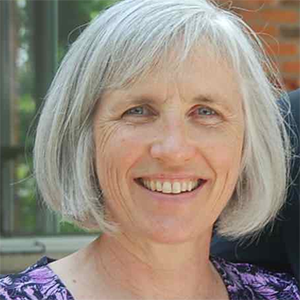
Director of the Language and Working Memory Lab, Dr. Lisa Archibald (Photo provided by Dr. Lisa Archibald)
The Language and Working Memory Lab, directed by Dr. Lisa Archibald, is part of the School of Communication Sciences and Disorders at The University of Western Ontario. The Language and Working Memory Lab focuses on investigating how language and memory processes interact in both children learning at a typical rate and those with learning disabilities.
The year of 2021 marked the completion of their doctoral training for Alexandra Cross and Theresa Pham. Dr. Theresa Pham has since started her postdoctoral fellowship at the Language and Working Memory Lab. Dr. Archibald and colleagues published extensively in 2021 in highly regarded journals, such as Journal of Speech, Language, and Hearing Research, and Memory and Cognition. In the 2020-2021 school year, the Language and Working Memory Lab partnered with the University of Western Ontario’s Child and Youth Development Clinic and the Learning Disabilities Association – London Region to compare two community-based reading instruction programs: Leap to Literacy vs. Wise Words. Dr. Archibald has also received funding from the Natural Sciences and Engineering Research Council of Canada (NSERC) to support her project on determining the cognitive, linguistic, and input features influencing oral language processing.
The mTBI Research Program
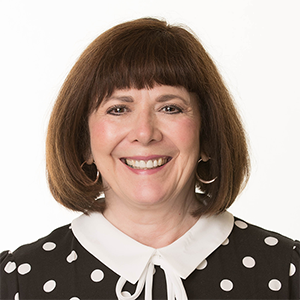
Director of the mTBI Research Program, Professor Carol DeMatteo (Photo Credit: Georgia Kirkos)
As a clinician scientist, Professor Carol DeMatteo specializes in childhood neurotrauma, specifically acquired brain injury including concussion. Professor DeMatteo officially retired in 2021 and has since assumed the rank of Professor Emeritus at McMaster University. Yet, she continues with her concussion research at CanChild Centre for Childhood Disability Research.
In 2021, Prof. DeMatteo and the team published their research on pediatric concussion in prestigious journals such as Journal of Concussion, Frontiers in Human Neuroscience, and BMJ Open Sport and Exercise. The result on correlating concussion-related symptoms to the personalized MRI assessment of brain abnormalities in children, which was a collaboration among Prof. DeMatteo, Drs. Connolly and Noseworthy and their trainees, was presented at the International Society of Magnetic Resonance in Medicine Annual Meeting in 2021.
The Performance Science Lab

Director of the Performance Science Lab, Dr. Ranil Sonnadara (Photo Credit: XXXX)
The Performance Science Lab, directed by Dr. Ranil Sonnadara, aims to understand the science and art behind human performance. More specifically, the lab investigates how individuals learn complex skills, how information flow across the motor and perceptual systems changes with practice, and how feedback and assessment can be effectively implemented to support skill acquisition. Much of the lab’s current work focuses on education of health professionals, musicians, and athletes.
In 2021, Kestrel McNeill completed her master’s degree and continues in the lab as a doctoral student. She received Mitacs funding to investigate Ontario’s digital research infrastructures needs assessment and capacity building alongside Dr. Sonnadara and Dr. Becker. In 2021 Dr. Sonnadara also received a McMaster Surgical Associated Education Research Grants to develop learning tools for medical students, and to study burn out in trainee and practicing surgeons. Dr. Sonnadara and the team published their research in esteemed journals such as the British Medical Journal, the Journal of Surgical Education and Medical Education.
- The Syntax Lab
- MELD Programs & The MELD Bilingualism Lab
- Teaching and Learning Lab
- Neurotechnology & Neuroplasticity Lab
- Language, Memory and Brain Lab – EEG
- Language, Reading and Cognitive Neuroscience Lab
- The Reading Lab
- Imaging Research Centre
- The Phonetics Lab
- The Reilly Lab
- Language, Memory and Brain Lab – Behavioural
- The Turkstra Lab
- The Language and Working Memory Lab
- The MTBI Research Program
- The Performance Science Lab
The Syntax Lab

Director of the Syntax Lab, Dr. Ivona Kučerová (Photo Credit: Georgia Kirkos)
Dr. Ivona Kučerová, director of the Syntax Lab, investigates syntactic structures, with a specific focus on the syntax-semantics interface. More specifically, the lab is investigating if, and how semantic information can modulate syntactic derivation. Both traditional fieldwork and experimental methods are used to collect data from cross-linguistically diverse languages, including Indigenous languages of Canada. The goal of this research is to identify and model universal and language-specific structural properties of human languages. The primary focus of the work currently conducted in the Syntax Lab is on modelling features at the syntax-semantics interface.
In 2021, Alish Kocz completed his master’s degree and Kurtis Commanda received Mitacs funding to pursue an internship with the Kahawi Theatre. Dr. Kučerová and her trainees presented on underspecification of nominal functional categories in Slavic and Semitic at the Olomouc Generative Syntax Colloquium, and the research evidence on the remnant licensing and structural economy in VP ellipsis was presented at the Annual Meeting of Formal Approaches to Slavic Linguistics. Dr. Kučerová also delivered a keynote talk on neuter gender in Slavic at the Slavic Linguistics Society 17.
MELD Programs & The MELD Bilingualism Lab

Associate Director of the ARiEAL Research Centre and Director of MELD programs and the Bilingualism Lab, Dr. Anna Moro (centre). Photographed together with Rita Jiang, Communications Associate of MELD Programs (left) and Yasmin Mohamed, Instructional Assistant of MELD Programs (right). (Photo Credit: Angela Herring-Lauzon)
The McMaster English Language Development (MELD) Programs and the MELD Bilingualism Lab are directed by Dr. Anna Moro. The MELD programs are intended for international students whose primary language is not English but who wish to improve their English proficiency to succeed in an English-speaking higher education environment. Since 2018, the MELD Programs have expanded their services from the MELD Diploma to also include McMaster English Readiness for Graduate Excellence (MERGE) and McMaster Office for the Development of English Language Learners (MODEL) to offer an even more comprehensive range of services to international students of all levels. Both MELD and MODEL incorporate problem-based learning and reflective practice in their curriculum, and were offered virtually during the pandemic.
The MELD Bilingualism Lab investigates the underlying linguistic mechanisms of bilingual phenomena and focuses on second language development. Together with postdoctoral researcher Dr. Daniel Schmidtke, results from a longitudinal eye movement study on the determinants of word-reading development in MELD cohorts were published in Reading Research Quarterly. Dr. Anna Moro, Dr. Daniel Schmidtke, and Sadaf Rahmanian also presented this longitudinal eye movement study at the Words in the World International Conference 2021.
Teaching and Learning Lab

Dr. Anderson, Director of the Teaching and Learning Lab (Photo Credit: Lindsay Palmer)
Dr. Catherine Anderson, an Associate Professor in the Department of Linguistics and Languages, directs the Teaching and Learning Lab. The lab collaborates with undergraduate student partners and focuses on students’ experiences in a variety of undergraduate learning contexts. Dr. Anderson founded TILCoP Canada, the Teaching in Linguistics Community of Practice: a collective of faculty members from across Canada who meet regularly to share practices and resources since 2020. The group also created and produced Word to the Whys, a companion podcast for Intro Linguistics courses. Dr. Anderson also received funding from eCampusOntario to develop the second edition of the open-source textbook, Essentials of Linguistics.
Neurotechnology & Neuroplasticity Lab

Director of the Neurotechnology & Neuroplasticity Lab, Dr. Sue Becker (Photo provided by Dr. Sue Becker)
Dr. Sue Becker is the director of the Neurotechnology & Neuroplasticity Lab, which uses computational modeling and empirical studies to investigate the neural bases of learning and memory and how it serves in episodic future thinking, planning and decision-making. Dr. Becker’s lab addresses research questions such as how the hippocampus codes episodic and spatial memories, and how stress, exercise, and neurofeedback affect hippocampal memory functions and intrinsic brain networks. This research can be applied to brain-computer-interfaces, sensory substitution for prosthetic limbs, and furthering our understanding of memory related disorders such as post-traumatic stress disorder.
In 2021, Saurabh Shaw and Leila Mousapour completed their doctoral and master’s degree, respectively. Mohammad Chaposhloo, a doctoral student, was awarded a MacData Fellowship in 2021. Additionally, trainees of Dr. Becker and Dr. Sonnadara worked on a project focusing on Ontario’s digital research infrastructures needs assessment and capacity building with funding support from Mitacs. In 2021, Dr. Becker wrote a book chapter on memory of space in the Oxford Handbook of Human Memory, and other publications in Consciousness and Cognition and Brain and Cognition.
Language, Memory and Brain Lab – EEG

Co-director of the Language, Memory and Brain Lab, Dr. John Connolly (Photo Credit: Ron Scheffler)
The Language, Memory and Brain (LMB) Lab is co-directed by Drs. John Connolly and Elisabet Service. Dr. Connolly’s research focuses on using brain recordings (EEG) to investigate a range of neurocognitive phenomena including attention, memory, and language processing and the changes seen in brain injury and during recovery in conditions from concussion to coma. Dr. Connolly officially retired in 2021 and stepped down from the directorship of ARiEAL. He has since assumed the rank of Professor Emeritus at McMaster University and continued with an active research profile since his retirement.
In 2021, Kiersten Mangold completed her master’s degree and Dr. Paniz Tavakoli completed her postdoctoral fellowship at McMaster. Together with their trainees, Dr. Connolly collaborated with Dr. Noseworthy, and published their findings on the localization and identification of brain microstructural abnormalities in paediatric concussion in Frontiers in Neuroscience. Dr. Connolly was also an invited speaker at the University of Ghana where he discussed the electrophysiological assessment of neurocognitive function in health and pathology, and presented literature from acquired brain injury to post COVID syndrome. Dr. Connolly and the team continued their research work on determining the prognosis of comatose patients, and received additional funding with Dr. Paniz Tavakoli from the McMaster Arts Research Board to expand the coma study.
Language, Reading and Cognitive Neuroscience Lab

Director of the Language, Reading and Cognitive Neuroscience Lab, Dr. Marc Joanisse (Photo provided by Dr. Marc Joanisse)
Dr. Marc Joanisse directs the Language, Reading and Cognitive Neuroscience Lab which is housed in The University of Western Ontario’s Brain and Mind Institute. Dr. Joanisse’s research focuses on the cognitive and neural foundations of language and reading across the lifespan. This includes studying reading and language disorders in children, as well as language learning and processing in adults.
2021 was another fruitful year in peer-reviewed publications for Dr. Joanisse, his collaborators, and his trainees. Research results on resting-state functional connectivity and reading subskills in children and the reciprocal relations between reading skill and phonological awareness in children were disseminated in highly regarded journals, such as NeuroImage. Dr. Joanisse continues to work on advancing full literacy in a digital world as a part of his 7-year Social Sciences and Humanities Research Council (SSHRC) Partnership Grant.
The Reading Lab

Director of the Reading Lab, Dr. Victor Kuperman (Photo Credit: JD Howell)
The Reading Lab, directed by Dr. Victor Kuperman, targets a range of areas in psycholinguistics and corpus linguistics with research foci such as the cognitive and socio-demographic predictors of literacy and reading comprehension in adults across languages. The Reading Lab’s research paradigms include eye-tracking, behavioural studies, large-scale norming studies, and quantitative analyses of written and spoken corpora.
In 2021, Kelly Nisbet completed her doctoral degree, and Nadia Lana completed her master’s degree and continued to doctoral training at the Reading Lab. Dr. Kuperman received an Insight Grant from the Social Sciences and Humanities Research Council (SSHRC) to investigate the impact of COVID-19 on reading comprehension in Canadian and US university students. Dr. Kuperman and his collaborators and trainees generated many impactful publications in journals such as Journal of Experimental Psychology: General and Behavior Research Methods. Dr. Kuperman was invited to present the evidence on their new eye tracking corpora internationally in 2021. To further the research on the linguistic markers of social isolation, the Reading Lab initiated an intergenerational writing program “Writing Across Generations” for older adults and high school students at YMCA Spokane, WA, USA. A similar program will be launched in the Niagara region in 2022.
Imaging Research Centre

Director of the Imaging Research Centre, Dr. Michael Noseworthy
Dr. Michael Noseworthy is the director of Medical Imaging Physics and Engineering at the Imaging Research Centre at St. Joseph’s Healthcare, Hamilton. Dr. Noseworthy’s research interests focus on assessment of tissue microstructure and metabolism using multimodal medical imaging, such as the magnetic resonance imaging (MRI) and in vivo nuclear magnetic resonance (NMR) spectroscopy. His work considerably involves developing imaging hardware and software, and the research team works to study physiological problems and diseases using advanced medical imaging techniques.
Dr. Noseworthy and team published extensively in 2021, and their work appeared in the high impact journals, such as Journal of Science and Medicine in Sport and European Journal of Sport Science.
The Phonetics Lab

Director of the Phonetics Lab, Dr. Daniel Pape (Photo Credit: Colin Czerneda)
Dr. Daniel Pape is the director of the Phonetics Lab. His research examines experimental phonetics and speech acoustics, the link between speech production and speech perception, and the relationship between phonetics and neurolinguistics. Two new research streams were recently introduced at the Phonetics Lab. The first stream focuses on how different academic content, foreign accents and gender influence the accuracy of caption errors in academic online lectures and video conferences, a topic that was a focus of interest during the global pandemic. The second stream examines production and perception differences of bilingual speakers with different degrees of proficiency in their two languages, more specifically Canadian English/French speakers.
In 2021, Carla Weigel from the Phonetics Lab finished her master’s degree. Dr. Pape was a speaker at the 4th Phonetics and Phonology Conference in Europe (PaPE) where he presented his research on the perceptual cue weighting of intervocalic velar plosives in Canadian English. Together with his trainees, their work on applying automatic speech to text in academic settings for the deaf and hard of hearing was presented at the Current Research in Engineering, Science & Technology (CREST) Meeting in Hamilton, Ontario and at the LACUS conference in Toledo, Ohio. Dr. Pape also presented his collaborative work on Polish sibilant variability at the 50th Poznań Linguistic Meeting (PLM) in Poznań, Poland.
The Reilly Lab

Director of the Reilly Lab, Dr. Jim Reilly (Photo provided by Dr. Jim Reilly)
Dr. Jim Reilly is an internationally renowned researcher in the field of signal processing. His work focuses on the application of machine learning and signal processing in relation to health-related problems, such as neuroscience. Dr. Reilly specializes in the development of machine learning algorithms, and the effort has been applied to improving diagnosis and treatment of psychiatric illness, prognosis for coma outcome, and assessment of infant motor movement relating to neurological deficit.
In the year of 2021, Dr. Reilly and collaborators published their work on the advanced signal processing methods for characterization of schizophrenia in IEEE Transactions on Biomedical Engineering and their machine learning approach in identifying self-harm and suicidal ideation among military and police Veterans in the Journal of Military, Veteran and Family Health. Dr. Reilly and his collaborators were also awarded a New Frontiers in Research Funding to study the use of artificial intelligence to predict suicide attempts among youth, using his expertise in machine learning.
Language, Memory and Brain Lab – Behavioural

Co-director of the Language, Memory and Brain Lab, Dr. Elisabet Service (Photo Credit: Colin Czerneda)
The Language, Memory and Brain (LMB) Lab is co-directed by Drs. John Connolly and Elisabet Service. Dr. Service investigates the cognitive building blocks in language development and its relationship with working memory, alongside basic research on language acquisition, spoken word processing, and other related cognitive processes. Much of this work is then applied in investigations of language disorders including dyslexia.
In 2021, the results of Dr. Service’s collaborative project with the University of Helsinki on developmental language disorder were published in International Journal of Language Communication Disorders and Frontiers in Psychology, Language Sciences section. The findings suggests that that language disorder is associated with atypical development of short-term memory for temporal event order in both unilingual and bilingual children. Furthermore, order memory in atypical, but not in typical, language development is related to language abilities. This highlights nonverbal constraints on language development. Dr. Service also received funding from Social Sciences and Humanities Research Council (SSHRC) to investigate the effects of working in a second language on strategic thinking. Research by PhD candidate Fareeha Rana as well as former lab students Angie Lopez Ricote, Erin DeBorba and Meliha Horzum was presented at the annual conference of the Canadian Society for Brain, Behaviour and Cognitive Science (CSBBCS). The former lab students’ work as well as that of PhD candidate Bre-Anna Owusu was also presented at the conference of the Psychonomic Society.
The Turkstra Lab

Director of the Turkstra Lab, Dr. Lyn Turkstra (Photo provided by Dr. Lyn Turkstra)
Dr. Lyn Turkstra heads the Turkstra Lab, which focuses on the links between cognitive function and social communication in individuals with traumatic brain injury (TBI). The Lab conducts both experimental and translational research on communication in adolescents and adults, and collaborates on development of practice standards to translate research findings into improved clinical practice and long-term patient outcomes.
In 2021, the lab’s main activities related to an ongoing National Institutes of Health (NIH) funded project that aims to develop technologies to support people with TBI in using social media. As part of this project, PhD student Lisa Kakonge, and University of Wisconsin-Madison postdoctoral fellow Hajin Lim completed virtual focus groups with individuals with TBI in the US and Canada to learn about their social media experiences. Undergraduate student, Catherine Bosyj, completed a scoping review of literature on cognitive factors in computer use, results of which will be applied to the tech development; and former master’s student Reihaneh Ahmadi completed analysis of her “think aloud” thesis, which aimed to learn how and why people with TBI used social media. The lab had other exciting student-initiated projects, including a study of sex- and gender-based differences in cognition by Sukhman Baath, and Imad Ali’s study showing how emojis influence interpretation of text messages. In 2021, Dr. Turkstra and colleagues published extensively in well-respected journals, such as Brain, American Journal of Speech Language Pathology, and International Journal of Language Communication Disorders.
The Language and Working Memory Lab

Director of the Language and Working Memory Lab, Dr. Lisa Archibald (Photo provided by Dr. Lisa Archibald)
The Language and Working Memory Lab, directed by Dr. Lisa Archibald, is part of the School of Communication Sciences and Disorders at The University of Western Ontario. The Language and Working Memory Lab focuses on investigating how language and memory processes interact in both children learning at a typical rate and those with learning disabilities.
The year of 2021 marked the completion of their doctoral training for Alexandra Cross and Theresa Pham. Dr. Theresa Pham has since started her postdoctoral fellowship at the Language and Working Memory Lab. Dr. Archibald and colleagues published extensively in 2021 in highly regarded journals, such as Journal of Speech, Language, and Hearing Research, and Memory and Cognition. In the 2020-2021 school year, the Language and Working Memory Lab partnered with the University of Western Ontario’s Child and Youth Development Clinic and the Learning Disabilities Association – London Region to compare two community-based reading instruction programs: Leap to Literacy vs. Wise Words. Dr. Archibald has also received funding from the Natural Sciences and Engineering Research Council of Canada (NSERC) to support her project on determining the cognitive, linguistic, and input features influencing oral language processing.
The mTBI Research Program

Director of the mTBI Research Program, Professor Carol DeMatteo (Photo Credit: Georgia Kirkos)
As a clinician scientist, Professor Carol DeMatteo specializes in childhood neurotrauma, specifically acquired brain injury including concussion. Professor DeMatteo officially retired in 2021 and has since assumed the rank of Professor Emeritus at McMaster University. Yet, she continues with her concussion research at CanChild Centre for Childhood Disability Research.
In 2021, Prof. DeMatteo and the team published their research on pediatric concussion in prestigious journals such as Journal of Concussion, Frontiers in Human Neuroscience, and BMJ Open Sport and Exercise. The result on correlating concussion-related symptoms to the personalized MRI assessment of brain abnormalities in children, which was a collaboration among Prof. DeMatteo, Drs. Connolly and Noseworthy and their trainees, was presented at the International Society of Magnetic Resonance in Medicine Annual Meeting in 2021.
The Performance Science Lab

Director of the Performance Science Lab, Dr. Ranil Sonnadara (Photo provided by Dr. Ranil Sonnadara)
The Performance Science Lab, directed by Dr. Ranil Sonnadara, aims to understand the science and art behind human performance. More specifically, the lab investigates how individuals learn complex skills, how information flow across the motor and perceptual systems changes with practice, and how feedback and assessment can be effectively implemented to support skill acquisition. Much of the lab’s current work focuses on education of health professionals, musicians, and athletes.
In 2021, Kestrel McNeill completed her master’s degree and continues in the lab as a doctoral student. She received Mitacs funding to investigate Ontario’s digital research infrastructures needs assessment and capacity building alongside Dr. Sonnadara and Dr. Becker. In 2021 Dr. Sonnadara also received a McMaster Surgical Associated Education Research Grants to develop learning tools for medical students, and to study burn out in trainee and practicing surgeons. Dr. Sonnadara and the team published their research in esteemed journals such as the British Medical Journal, the Journal of Surgical Education and Medical Education.
By the Numbers
Despite the ongoing challenges imposed by the global pandemic, ARiEAL researchers and their trainees continue to demonstrating their research expertise through peer-reviewed publications and presentations, while maintaining a track record of successful research funding of all levels throughout 2021.
Publications
Presentations
Grants
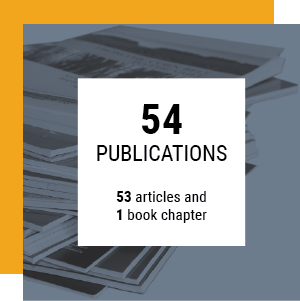 ARiEAL researchers published 53 articles and 1 book chapter in 2021. Broadly, the research topics included language acquisition, word reading, working memory and the use of neuroimaging and machine learning in brain injury and other clinical fields.
ARiEAL researchers published 53 articles and 1 book chapter in 2021. Broadly, the research topics included language acquisition, word reading, working memory and the use of neuroimaging and machine learning in brain injury and other clinical fields.
Featured below are a selection of these articles:
Bootsma, J. N., Turkstra, L. S., & Gorter, J. W. (2021). Expression of propositional attitudes in conversation by adults with traumatic brain injury: A relevance theoretic approach. International Journal of Language & Communication Disorders, 56(2), 346-359. https://doi.org/10.1111/1460-6984.12608
Cross, A. M., Ramdajal, R., Peters, L., Vandermeer, M. R. J., Hayden, E. P., Frijters, J. C., Steinbach, K. A., Lovett, M. W., Archibald, L. M. D., & Joanisse, M. F. (2021). Resting-state functional connectivity and reading subskills in children. NeuroImage, 243, 118529. https://doi.org/10.1016/j.neuroimage.2021.118529
Kuperman, V., Bar-On, A., Bertram, R., Boshra, R., Deutsch, A., Kyröläinen, A. J., Mathiopoulou, B., Oralova, G., & Protopapas, A. (2021). Prevalence of Spelling Errors Affects Reading Behavior Across Languages. Journal of Experimental Psychology: General, 150(10), 1974–1993. https://doi.org/10.1037/xge0001038
Schmidtke, D., & Moro, A. (2021). Determinants of Word-Reading Development in English Learner University Students: A Longitudinal Eye Movement Study. Reading Research Quarterly, 56(4), 819–854. https://doi.org/10.1002/rrq.362
Stillo, D., Danielli, E., Ho, R. A., DeMatteo, C., Hall, G. B., Bock, N. A., Connolly, J. F., & Noseworthy, M. D. (2021). Localization and Identification of Brain Microstructural Abnormalities in Paediatric Concussion. Frontiers in Human Neuroscience, 15, 657374. https://doi.org/10.3389/fnhum.2021.657374
View full list of 2021 articles Acai, A., Cupido, N., Weavers, A., Saperson, K., Ladhani, M., Cameron, S., & Sonnadara, R. R. (2021). Competence committees: The steep climb from concept to implementation. Medical Education, 55(9), 1067–1077. https://doi.org/10.1111/medu.14585 Ahmed, B. A., Ong, F. J., Barra, N. G., Blondin, D. P., Gunn, E., Oreskovich, S. M., Szamosi, J. C., Syed, S. A., Hutchings, E. K., Konyer, N. B., Singh, N. P., Yabut, J. M., Desjardins, E. M., Anhê, F. F., Foley, K. P., Holloway, A. C., Noseworthy, M. D., Haman, F., Carpentier, A. C., … Morrison, K. M. (2021). Lower brown adipose tissue activity is associated with non-alcoholic fatty liver disease but not changes in the gut microbiota. Cell Reports Medicine, 2(9), 100397. https://doi.org/10.1016/j.xcrm.2021.100397 Bartošová, J., Chapman, C., Kučerová, I., & Service, E. (2021). Making semantic commitments can be delayed: Evidence from aspectual processing. Canadian Journal of Experimental Psychology/Revue Canadienne de Psychologie Expérimentale, 75(1), 77-92. http://dx.doi.org/10.1037/cep0000227 Bootsma, J. N., Turkstra, L. S., & Gorter, J. W. (2021). Expression of propositional attitudes in conversation by adults with traumatic brain injury: A relevance theoretic approach. International Journal of Language & Communication Disorders, 56(2), 346-359. https://doi.org/10.1111/1460-6984.12608 Bugden, S., Peters, L., Nosworthy, N., Archibald, L. M. D., & Ansari, D. (2021). Identifying Children with Persistent Developmental Dyscalculia from a 2-min Test of Symbolic and Nonsymbolic Numerical Magnitude Processing. Mind, Brain, and Education, 15(1), 88–102. https://doi.org/10.1111/mbe.12268 Byom, L., Whaln, M. S., & Turkstra, L. S. (2021). Working memory for emotions in adolescents and young adults with traumatic brain injury. Brain Impairment, 1–15. https://doi.org/10.1017/BrImp.2021.20 Colic, S., He, J. C., Richardson, J. D., Cyr, K. St., Reilly, J. P., & Hasey, G. M. (2021). A machine learning approach to identification of self-harm and suicidal ideation among military and police Veterans. Journal of Military, Veteran and Family Health, 8(1), 56–67. https://doi.org/10.3138/jmvfh-2021-0035 Coughler, C., Hamel, E. M., Cardy, J. O., Archibald, L. M. D., & Purcell, D. W. (2021). Compensation to Altered Auditory Feedback in Children With Developmental Language Disorder and Typical Development. Journal of Speech, Language, and Hearing Research, 64(6S), 2363–2376. https://doi.org/10.1044/2020_JSLHR-20-00374 Cross, A. M., Ramdajal, R., Peters, L., Vandermeer, M. R. J., Hayden, E. P., Frijters, J. C., Steinbach, K. A., Lovett, M. W., Archibald, L. M. D., & Joanisse, M. F. (2021). Resting-state functional connectivity and reading subskills in children. NeuroImage, 243, 118529. https://doi.org/10.1016/j.neuroimage.2021.118529 DeMatteo, C., Bednar, E. D., Randall, S., & Falla, K. (2021). Effectiveness of return to activity and return to school protocols for children postconcussion: A systematic review. BMJ Open Sport & Exercise Medicine, 6(1), e000667. https://doi.org/10.1136/bmjsem-2019-000667 Evans, V., Behr, M., Gangwar, A., Noseworthy, M. D., & Kumbhare, D. (2021). Potential Role of MRI Imaging for Myofascial Pain: A Scoping Review for the Clinicians and Theoretical Considerations.. Journal of Pain Research, 14, 1505–1514. https://doi.org/10.2147/JPR.S302683 Falla, K. A., Randall, S., & DeMatteo, C. (2021). Brain smart – Let’s play safely: Evaluation of a concussion education program in schools. Journal of Concussion, 5, 20597002211024450. https://doi.org/10.1177/20597002211024447 Gatti, A. A., Keir, P. J., Noseworthy, M. D., Beauchamp, M. K., & Maly, M. R. (2021). Hip and ankle kinematics are the most important predictors of knee joint loading during bicycling. Journal of Science and Medicine in Sport, 24(1), 98–104. https://doi.org/10.1016/j.jsams.2020.07.001 Gatti, A. A., Keir, P. J., Noseworthy, M. D., Beauchamp, M. K., & Maly, M. R. (2021). Equations to Prescribe Bicycle Saddle Height based on Desired Joint Kinematics and Bicycle Geometry. European Journal of Sport Science, 22(3), 344–353. https://doi.org/10.1080/17461391.2021.1902570 Grool, A. M., DeMatteo, C., Reed, N., Newhook, D., & Zemek, R. (2021). Patient, parent and educator perspectives on paediatric concussion. Journal of Concussion, 5, 2059700220969535. https://doi.org/10.1177/2059700220969535 Hardin, K. Y., Black, C., Caldbick, K., Kelly, M., Malhotra, A., Tidd, C., Vallentin, T., & Turkstra, L. S. (2021). Current Practices Among Speech-Language Pathologists for Mild Traumatic Brain Injury: A Mixed-Methods Modified Delphi Approach. American Journal of Speech-Language Pathology, 30(4), 1625–1655. Imbault, C., Titone, D., Warriner, A. B., & Kuperman, V. (2021). How are words felt in a second language: Norms for 2,628 English words for valence and arousal by L2 speakers. Bilingualism: Language and Cognition, 24(2), 281–292. https://doi.org/10.1017/S1366728920000474 Kinley, I., Porteous, M., Levy, Y., & Becker, S. (2021). Visual perspective as a two-dimensional construct in episodic future thought. Consciousness and Cognition, 93, 103148. https://doi.org/10.1016/j.concog.2021.103148 Kuperman, V., Bar-On, A., Bertram, R., Boshra, R., Deutsch, A., Kyröläinen, A. J., Mathiopoulou, B., Oralova, G., & Protopapas, A. (2021). Prevalence of Spelling Errors Affects Reading Behavior Across Languages. Journal of Experimental Psychology: General, 150(10), 1974–1993. https://doi.org/10.1037/xge0001038 Kuperman, V., Kyröläinen, A.-J., Porretta, V., Brysbaert, M., & Yang, S. (2021). A lingering question addressed: Reading rate and most efficient listening rate are highly similar. Journal of Experimental Psychology Human Perception & Performance, 47(8), 1103–1112. https://doi.org/10.1037/xhp0000932 Kyröläinen, A.-J., Keuleers, E., Mandera, P., Brysbaert, M., & Kuperman, V. (2021). Affect across adulthood: Evidence from English, Dutch and Spanish. Journal of Experimental Psychology General, 150(4), 792–812. https://doi.org/10.1037/xge0000950 Kyröläinen, A.-J., & Kuperman, V. (2021). The Effect of Loneliness on Cognitive Functioning Among Healthy Individuals in Mid- and Late-Adulthood: Evidence From the Canadian Longitudinal Study on Aging (CLSA). Frontiers in Psychology, 12, 3744. https://doi.org/10.3389/fpsyg.2021.701305 Kyröläinen, A.-J., & Kuperman, V. (2021). Predictors of literacy in adulthood: Evidence from 33 countries. PLOS ONE, 16(3), e0243763. https://doi.org/10.1371/journal.pone.0243763 Lahti-Nuuttila, P., Laasonen, M., Smolander, S., Kunnari, S., Arkkila, E., & Service, E. (2021). Language acquisition of early sequentially bilingual children is moderated by short-term memory for order in developmental language disorder: Findings from the HelSLI study. International Journal of Language & Communication Disorders, 56(5), 907–926. https://doi.org/10.1111/1460-6984.12635 Lahti-Nuuttila, P., Service, E., Smolander, S., Kunnari, S., Arkkila, E., & Laasonen, M. (2021). Short-Term Memory for Serial Order Moderates Aspects of Language Acquisition in Children With Developmental Language Disorder: Findings From the HelSLI Study. Frontiers in Psychology, 12, 608069. https://www.frontiersin.org/article/10.3389/fpsyg.2021.608069 Ledoux, A.-A., Barrowman, N., Bijelić, V., Borghese, M. M., Davis, A., Reid, S., Sangha, G., Yeates, K. O., Tremblay, M. S., McGahern, C., Belanger, K., Barnes, J. D., Farion, K. J., DeMatteo, C., Reed, N., & Zemek, R. (2021). Is early activity resumption after paediatric concussion safe and does it reduce symptom burden at 2 weeks post injury? The Pediatric Concussion Assessment of Rest and Exertion (PedCARE) multicentre randomised clinical trial. British Journal of Sports Medicine, 56(5), 271–278. https://doi.org/10.1136/bjsports-2021-105030 Li, J., & Joanisse, M. F. (2021). Word Senses as Clusters of Meaning Modulations: A Computational Model of Polysemy. Cognitive Science, 45(4), e12955. https://doi.org/10.1111/cogs.12955 Liu, P., Vandermeer, M. R. J., Mohamed Ali, O., Daoust, A. R., Joanisse, M. F., Barch, D. M., & Hayden, E. P. (2021). Maternal Depression, Child Temperament, and Early-Life Stress Predict Never-Depressed Preadolescents’ Functional Connectivity During a Negative-Mood Induction.. Clinical Psychological Science, 10(1), 141–160. https://doi.org/10.1177/21677026211016419 Lou, C., Cross, A. M., Peters, L., Ansari, D., & Joanisse, M. F. (2021). Rich-club structure contributes to individual variance of reading skills via feeder connections in children with reading disabilities. Developmental Cognitive Neuroscience, 49, 100957. https://doi.org/10.1016/j.dcn.2021.100957 Maslej, M., Mar, R. A., & Kuperman, V. (2021). The textual features of fiction that appeal to readers: Emotion and abstractness. – PsycNET. Psychology of Aesthetics, Creativity, and the Arts, 15(2), 272–283. https://psycnet.apa.org/doi/10.1037/aca0000282 Masychev, K., Ciprian, C., Ravan, M., Reilly, J. P., & MacCrimmon, D. (2021). Advanced Signal Processing Methods for Characterization of Schizophrenia. IEEE Transactions on Biomedical Engineering, 68(4), 1123–1130. https://doi.org/10.1109/TBME.2020.3011842 McCarron, S. P., & Kuperman, V. (2021). Is the author recognition test a useful metric for native and non-native English speakers? An item response theory analysis. Behavior Research Methods, 53(5), 2226–2237. https://doi.org/10.3758/s13428-021-01556-y McCrindle, B., Zukotynski, K., Doyle, T. E., & Noseworthy, M. D. (2021). A Radiology-focused Review of Predictive Uncertainty for AI Interpretability in Computer-assisted Segmentation. Radiology: Artificial Intelligence, 3(6), e210031. https://doi.org/10.1148/ryai.2021210031 Morrow, E. L., Turkstra, L. S., & Duff, M. C. (2021). Confidence and Training of Speech-Language Pathologists in Cognitive-Communication Disorders: Time to Rethink Graduate Education Models?. American Journal of Speech-Language Pathology, 30(2S), 986–992. https://doi.org/10.1044/2020_AJSLP-20-00073 Morrow, E. L., Zhao, F., Turkstra, L. S., Toma, C., Mutlu, B., & Duff, M. C. (2021). Computer-Mediated Communication in Adults With and Without Moderate-to-Severe Traumatic Brain Injury: Survey of Social Media Use. Journal of Medical Internet Research Rehabilitation and Assistive Technologies, 8(3), e26586. https://doi.org/10.2196/26586 Nichols, E. S., Gao, Y., Fregni, S., Liu, L., & Joanisse, M. F. (2021). Individual differences in representational similarity of first and second languages in the bilingual brain. Human Brain Mapping, 42(16), 5433–5445. https://doi.org/10.1002/hbm.25633 Parks, K. M. A., Moreau, C. N., Hannah, K. E., Brainin, L., & Joanisse, M. F. (2021). The Task Matters: A Scoping Review on Reading Comprehension Abilities in ADHD. Journal of Attention Disorders, 10870547211068047. https://doi.org/10.1177/10870547211068047 Pauls, L. J., & Archibald, L. M. D. (2021). Cognitive and linguistic effects of narrative-based language intervention in children with Developmental Language Disorder. Autism & Developmental Language Impairments, 6, 23969415211015868. https://doi.org/10.1177/23969415211015867 Pham, T., & Archibald, L. M. D. (2021). The role of phonological and semantic representations in verbal short-term memory and delayed retention. Memory & Cognition, 50(2), 325–338. https://doi.org/10.3758/s13421-021-01216-8 Polak, P., Schulte, R. F., & Noseworthy, M. D. (2021). An approach to evaluation of the point-spread function for 23Na magnetic resonance imaging. Nuclear Magnetic Resonance in Biomedicine, 35(2), e4627. https://doi.org/10.1002/nbm.4627 Pratile, T., Marshall, C., & DeMatteo, C. (2021). Examining how time from sport-related concussion to initial assessment predicts return-to-play clearance. The Physician and Sportsmedicine, 50(2), 132-140. https://doi.org/10.1080/00913847.2021.1879603 Rafat, Y., Whitford, V., Joanisse, M. F., Swiderski, N., Cornwell, S., Mohaghegh, M., Valdivia, C., Fakoornia, N., Nasrollahzadeh, P., & Habibi, L. (2021). First-language-specific orthographic effects in second-language speech: A comparison of Korean–English and Farsi–English bilinguals. Journal of Monolingual and Bilingual Speech, 3(1), 102–122. https://doi.org/10.1558/jmbs.15682 Rokos, A., Mah, R., Boshra, R., Harrison, A., Choy, T. L., Blain-Moraes, S., & Connolly, J. F. (2021). Eliciting and Recording Event Related Potentials (ERPs) in Behaviourally Unresponsive Populations: A Retrospective Commentary on Critical Factors. Brain Sciences, 11(7), 835. https://doi.org/10.3390/brainsci11070835 Roshan, A., Wagner, N., Acai, A., Emmerton-Coughlin, H., Sonnadara, R. R., Scott, T. M., & Karimuddin, A. A. (2021). Comparing the Quality of Narrative Comments by Rotation Setting. Journal of Surgical Education, 78(6), 2070–2077. https://doi.org/10.1016/j.jsurg.2021.06.012 Schmidtke, D., & Moro, A. (2021). Determinants of Word-Reading Development in English Learner University Students: A Longitudinal Eye Movement Study. Reading Research Quarterly, 56(4), 819–854. https://doi.org/10.1002/rrq.362 Schmidtke, D., Van Dyke, J. A., & Kuperman, V. (2021). CompLex: An eye-movement database of compound word reading in English. Behavior Research Methods, 53(1), 59–77. https://doi.org/10.3758/s13428-020-01397-1 Shaw, S. B., McKinnon, M. C., Heisz, J., & Becker, S. (2021). Dynamic task-linked switching between brain networks – A tri-network perspective. Brain and Cognition, 151, 105725. https://doi.org/10.1016/j.bandc.2021.105725 Sikkes, S. A. M., Tang, Y., Jutten, R. J., Wesselman, L. M. P., Turkstra, L. S., Brodaty, H., Clare, L., Cassidy-Eagle, E., Cox, K. L., Chételat, G., Dautricourt, S., Dhana, K., Dodge, H., Dröes, R.-M., Hampstead, B. M., Holland, T., Lampit, A., Laver, K., Lutz, A., … Bahar-Fuchs, A. (2021). Toward a theory-based specification of non-pharmacological treatments in aging and dementia: Focused reviews and methodological recommendations. Alzheimer’s & Dementia, 17(2), 255–270. https://doi.org/10.1002/alz.12188 Stillo, D., Danielli, E., Ho, R. A., DeMatteo, C., Hall, G. B., Bock, N. A., Connolly, J. F., & Noseworthy, M. D. (2021). Localization and Identification of Brain Microstructural Abnormalities in Paediatric Concussion. Frontiers in Human Neuroscience, 15, 657374. https://doi.org/10.3389/fnhum.2021.657374 Valera, E. M., Joseph, A.-L. C., Snedaker, K., Breiding, M. J., Robertson, C. L., Colantonio, A., Levin, H., Pugh, M. J., Yurgelun-Todd, D., Mannix, R., Bazarian, J. J., Turtzo, L. C., Turkstra, L. S., Begg, L., Cummings, D. M., & Bellgowan, P. S. F. (2021). Understanding Traumatic Brain Injury in Females: A State-of-the-Art Summary and Future Directions. The Journal of Head Trauma Rehabilitation, 36(1), E1–E17. https://doi.org/10.1097/HTR.0000000000000652 Vollebregt, M., Leggett, J., Raffalovitch, S., King, C., Friesen, D., & Archibald, L. M. D. (2021). Evidence for complementary effects of code- and knowledge-focused reading instruction. Child Language Teaching and Therapy, 37(3), 300–320. https://doi.org/10.1177/02656590211014246 Wang, J., Pines, J., Joanisse, M. F., & Booth, J. R. (2021). Reciprocal relations between reading skill and the neural basis of phonological awareness in 7- to 9-year-old children. NeuroImage, 236, 118083. https://doi.org/10.1016/j.neuroimage.2021.118083 Whyte, J., & Turkstra, L. S. (2021). Building a theoretical foundation for cognitive rehabilitation. Brain, 144(7), 1933–1935. https://doi.org/10.1093/brain/awab210
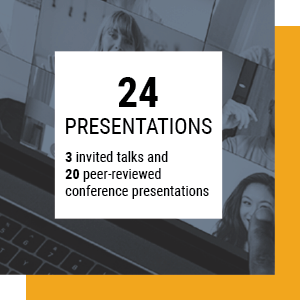 Despite the various cancelation and postponement of scientific conferences worldwide, ARiEAL researchers presented 19 peer-reviewed conference presentations and 4 invited talks virtually in 2021.
Despite the various cancelation and postponement of scientific conferences worldwide, ARiEAL researchers presented 19 peer-reviewed conference presentations and 4 invited talks virtually in 2021.
Featured below are a selection of these presentations:
Kučerová, I. & Szczegielniak, A. (2021, June). Underspecification of nominal functional categories in Slavic and Semitic. Olomouc Generative Syntax Colloquium. Olomouc, Czech Republic. (Delivered Online)
Pape, D., & Mercier, O. (2021, June). Perceptual cue weighting of intervocalic velar plosives in Canadian English. 4th Phonetics and Phonology Conference in Europe (PaPE). Barcelona, Spain. (Delivered Online)
Service, E., DeBorba, E., Lopez Ricote, A., & Horzum, M. (2021, November). Short-Term Memory for Patterns in Time and for Nonsense Sentences Predicts Learning of Foreign Words. 62nd Annual Meeting of the Psychonomic Society. New Orleans, USA. (Delivered Online)
View full list of 2021 presentations
Archibald, L. (2021, March & April). Criteria and crucial conversations about DLD (A two part series). Speech-Language and Audiology Canada. Ottawa, Canada. (Invited; Delivered Online) Connolly, J. (2021, March). Electrophysiological assessment of neurocognitive function in health and pathology: From Acquired Brain Injury to Post COVID Syndrome. Invited Lecturer at Centre for Ageing Studies, College of Humanities, University of Ghana. Accra, Ghana. (Invited; Delivered Online) Danielli, E., Stillo, D., Ho, R., DeMatteo, C., Hall, G.B., Bock, N., Connolly, J., & Noseworthy, M. (2021, May). Correlating concussion-related symptoms to the personalized MRI assessment of brain abnormalities in children. 2021 International Society of Magnetic Resonance in Medicine Annual Meeting. Vancouver, Canada. (Delivered Online) Ewers N., Hunt C.L., Mangold K., & Connolly J. (2021, June). Worth taking the hit? Understanding the effects of concussion and subconcussive impacts on cognitive health. Annual Canadian Psychological Association. Canada. (Delivered Online) Herrera-Diaz, A., Kolesar, R., Boshra, R., Reilly, J., Tavakoli, P., Pajankar, N., Lin, C., Bagheri, E., Morrison, H., & Connolly, J. (2021, July). Multivariate Decoding of Auditory Event-Related Potentials to Track Coma Progression. Virtual World Congress on Brain Injury. Alexandria, USA. (Delivered Online) Kučerová, I. (2021, September). Neuter is a lonely gender. Slavic Linguistics Society (SLS) 16. Champaign, IL, USA. (Invited; Delivered Online) Kučerová, I. & Szczegielniak, A. (2021, June). Underspecification of nominal functional categories in Slavic and Semitic. Olomouc Generative Syntax Colloquium. Olomouc, Czech Republic. (Delivered Online) Kučerová, I. & Szczegielniak, A. (2021, May). Remnant licensing and structural economy in VP ellipsis: Evidence from Czech. Annual Meeting of Formal Approaches to Slavic Linguistics. Cambridge, USA. (Delivered Online) Kuperman, V. (2021, June). How to study reading comprehension and fluency in the first and second language using eye-tracking data. 8th Summer NeuroLinguistics School. Moscow, Russia. (Invited; Delivered Online) Kuperman, V. (2021, May). What makes us proficient readers in a second language: new eye-tracking corpora. Invited Talk at the Department of Linguistics at Montclair State University. Montclair, USA. (Invited; Delivered Online) Kuperman, V. (2021, March). Reading proficiency in second language: new evidence from eye-tracking corpora. Invited Talk at the University of Belgrade. Belgrade, Serbia. (Invited; Delivered Online) Lorenc, A., Żygis, M., Pape, D., & Mik, L. (2021, September). Articulatory and acoustic variation in the realization of Polish retroflexes. 50th Poznań Linguistic Meeting (PLM). Poznań, Poland. (Delivered Online) Lorenc, A., Żygis, M., Pape, D., & Mik, L. (2021, September). Articulatory characteristics of Polish retroflex sibilants. Conference of the Commission for Phonetics and Phonology of Slavic Languages of the International Slavic Committee. Zagreb, Croatia. (Delivered Online) Mann, R., Acai, A., & Sonnadara, R. (2021, March). Data source prioritization among novice raters in competence committee decision making. 3rd Annual Ontario Student Medical Education Research Conference. Toronto, Canada. (Delivered Online) Mousapour, L., Dabagh, Y., Dhindsa, K., Reilly, J., Connolly, J., & Becker, S. (2021, February). EEG source space analysis for brain-computer interfaces. Vector Institute Research Symposium. Toronto, Canada. (Poster; Invited; Delivered Online) Owusu, B. & Service, E. Can musical rhythm primes boost memory for new word forms in dyslexia? 62nd Annual Meeting of the Psychonomic Society, New Orleans, USA, November 4th–7th, 2021. (Poster: Delivered Online) Pape, D., & Mercier, O. (2021, June). Perceptual cue weighting of intervocalic velar plosives in Canadian English. 4th Phonetics and Phonology Conference in Europe (PaPE). Barcelona, Spain. (Delivered Online) Rana, F. & Service, E. (2021, June). The building blocks of temporal variation in language processing. Canadian Society for Brain, Behaviour and Cognitive Science. Montreal, Canada. (Delivered Online) Reilly, J. (2021, June). Analysis of ERP data Using Principal Components in Time and Space. Presentation at the Coma Research Group. Hamilton, Canada. (Invited; Delivered Online) Schmidtke, D., Rahmanian, S., & Moro, A. (2021, November). Reading experience drives L2 reading development: a longitudinal study of EAL reading habits. Words in the World International Conference 2021. St. Catharines, Canada. (Delivered Online) Service, E., DeBorba, E., Lopez Ricote, A., & Horzum, M. (2021, November). Short-Term Memory for Patterns in Time and for Nonsense Sentences Predicts Learning of Foreign Words. 62nd Annual Meeting of the Psychonomic Society. New Orleans, USA. (Delivered Online) Service, E., DeBorba, E., Lopez Ricote, A., & Horzum, M. (2021, June). Individual differences in foreign word form learning: Roles for rhythm and STM for non-sentences. Canadian Society for Brain, Behaviour and Cognitive Science. Montreal, Canada. (Delivered Online) Weigel, C., Pape, D., & Stroińska, M. (2021, July). Applying Automatic Speech to Text in Academic Settings for the Deaf and Hard of Hearing. LACUS Virtual Conference. Toledo, USA. (Delivered Online) Weigel, C., Pape, D., & Stroińska, M. (2021, March). Applying Automatic Speech to Text in Academic Settings for the Deaf and Hard of Hearing. Current Research in Engineering, Science & Technology (CREST) Meeting. Hamilton, Canada. (Delivered Online)
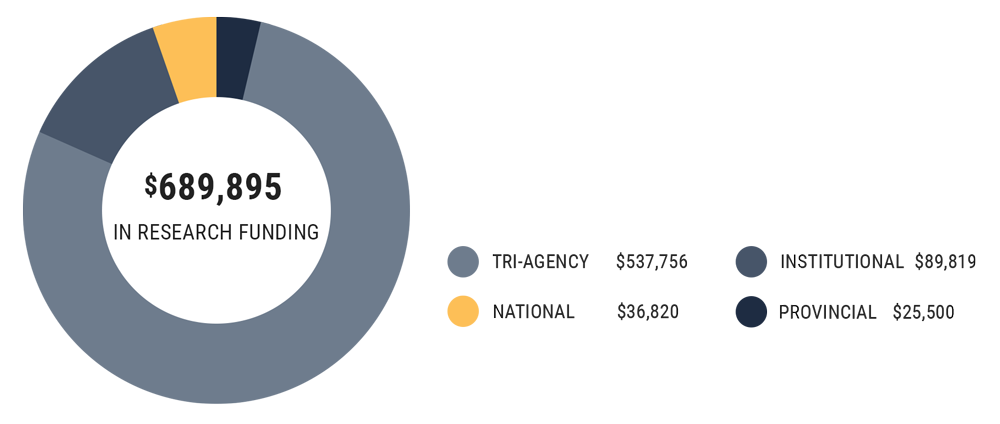
ARiEAL researchers received funding for 10 new research projects as Principal Investigators or Co-investigators in 2021. The total funding reached almost $700,000 dollars across these newly commenced projects.
Funding sources include the Social Sciences and Humanities Research Council (SSHRC), the Natural Sciences and Engineering Research Council of Canada (NSERC), and Mitacs, as well as various other funding agencies.
View full list of 2021 grants Anderson C., Bjorkman, B., Doner, J., Grant, M., Mills, T., Sanders, N., & Taniguchi, A. Essentials of Linguistics 2nd edition. eCampusOntario, $25,500, 2021-2022. Archibald, L. Determining the cognitive, linguistic, and input features influencing oral language processing. The Natural Sciences and Engineering Research Council of Canada, $140,000, 2021. Blundon, E., Krueger-Naug, A.M. & Connolly, J. Describing aspects of brain function at end of life. Dalhousie University, $60,000, 2021. Commanda, K. & Kučerová, I. Internship Award with Kahawi Theatre. Mitacs, $15,000, 2021. Kapczinski, F., Reilly, J., et al. The use of artificial intelligence to predict suicide attempts among youth: a machine learning approach. Social Sciences and Humanities Research Council, $247,088, 2021-2023. Kuperman, V. Understanding the impact of COVID-19 on reading comprehension in Canadian and US university students: a multi-componential approach. Social Sciences and Humanities Research Council, $38,835, 2021-2026. McNeill, K., Becker, S., & Sonnadara, R. Ontario’s digital research infrastructures needs assessment and capacity building. Mitacs, $15,000, 2021-2022. Peterson, D. & Sonnadara R. A Self-Directed Learning Tool for Orthopedics in Undergraduate Medical Education. McMaster University, $29,818.51, 2021. Service, E. & Connelly, C. The effects of working in a second language on strategic thinking. Social Sciences and Humanities Research Council, $150,668, 2021-2025. Tavakoli, P. & Connolly, J. Using electrophysiology to differentiate between disorders of consciousness. McMaster Arts Research Board, $6,820, 2021.

ARiEAL researchers published 53 articles and 1 book chapter in 2021. Broadly, the research topics included language acquisition, word reading, working memory and the use of neuroimaging and machine learning in brain injury and other clinical fields.
Featured below are a selection of these articles:
Bootsma, J. N., Turkstra, L. S., & Gorter, J. W. (2021). Expression of propositional attitudes in conversation by adults with traumatic brain injury: A relevance theoretic approach. International Journal of Language & Communication Disorders, 56(2), 346-359. https://doi.org/10.1111/1460-6984.12608
Cross, A. M., Ramdajal, R., Peters, L., Vandermeer, M. R. J., Hayden, E. P., Frijters, J. C., Steinbach, K. A., Lovett, M. W., Archibald, L. M. D., & Joanisse, M. F. (2021). Resting-state functional connectivity and reading subskills in children. NeuroImage, 243, 118529. https://doi.org/10.1016/j.neuroimage.2021.118529
Kuperman, V., Bar-On, A., Bertram, R., Boshra, R., Deutsch, A., Kyröläinen, A. J., Mathiopoulou, B., Oralova, G., & Protopapas, A. (2021). Prevalence of Spelling Errors Affects Reading Behavior Across Languages. Journal of Experimental Psychology: General, 150(10), 1974–1993. https://doi.org/10.1037/xge0001038
Schmidtke, D., & Moro, A. (2021). Determinants of Word-Reading Development in English Learner University Students: A Longitudinal Eye Movement Study. Reading Research Quarterly, 56(4), 819–854. https://doi.org/10.1002/rrq.362
Stillo, D., Danielli, E., Ho, R. A., DeMatteo, C., Hall, G. B., Bock, N. A., Connolly, J. F., & Noseworthy, M. D. (2021). Localization and Identification of Brain Microstructural Abnormalities in Paediatric Concussion. Frontiers in Human Neuroscience, 15, 657374. https://doi.org/10.3389/fnhum.2021.657374
View full list of 2021 articles Acai, A., Cupido, N., Weavers, A., Saperson, K., Ladhani, M., Cameron, S., & Sonnadara, R. R. (2021). Competence committees: The steep climb from concept to implementation. Medical Education, 55(9), 1067–1077. https://doi.org/10.1111/medu.14585 Ahmed, B. A., Ong, F. J., Barra, N. G., Blondin, D. P., Gunn, E., Oreskovich, S. M., Szamosi, J. C., Syed, S. A., Hutchings, E. K., Konyer, N. B., Singh, N. P., Yabut, J. M., Desjardins, E. M., Anhê, F. F., Foley, K. P., Holloway, A. C., Noseworthy, M. D., Haman, F., Carpentier, A. C., … Morrison, K. M. (2021). Lower brown adipose tissue activity is associated with non-alcoholic fatty liver disease but not changes in the gut microbiota. Cell Reports Medicine, 2(9), 100397. https://doi.org/10.1016/j.xcrm.2021.100397 Bartošová, J., Chapman, C., Kučerová, I., & Service, E. (2021). Making semantic commitments can be delayed: Evidence from aspectual processing. Canadian Journal of Experimental Psychology/Revue Canadienne de Psychologie Expérimentale, 75(1), 77-92. http://dx.doi.org/10.1037/cep0000227 Bootsma, J. N., Turkstra, L. S., & Gorter, J. W. (2021). Expression of propositional attitudes in conversation by adults with traumatic brain injury: A relevance theoretic approach. International Journal of Language & Communication Disorders, 56(2), 346-359. https://doi.org/10.1111/1460-6984.12608 Bugden, S., Peters, L., Nosworthy, N., Archibald, L. M. D., & Ansari, D. (2021). Identifying Children with Persistent Developmental Dyscalculia from a 2-min Test of Symbolic and Nonsymbolic Numerical Magnitude Processing. Mind, Brain, and Education, 15(1), 88–102. https://doi.org/10.1111/mbe.12268 Byom, L., Whaln, M. S., & Turkstra, L. S. (2021). Working memory for emotions in adolescents and young adults with traumatic brain injury. Brain Impairment, 1–15. https://doi.org/10.1017/BrImp.2021.20 Colic, S., He, J. C., Richardson, J. D., Cyr, K. St., Reilly, J. P., & Hasey, G. M. (2021). A machine learning approach to identification of self-harm and suicidal ideation among military and police Veterans. Journal of Military, Veteran and Family Health, 8(1), 56–67. https://doi.org/10.3138/jmvfh-2021-0035 Coughler, C., Hamel, E. M., Cardy, J. O., Archibald, L. M. D., & Purcell, D. W. (2021). Compensation to Altered Auditory Feedback in Children With Developmental Language Disorder and Typical Development. Journal of Speech, Language, and Hearing Research, 64(6S), 2363–2376. https://doi.org/10.1044/2020_JSLHR-20-00374 Cross, A. M., Ramdajal, R., Peters, L., Vandermeer, M. R. J., Hayden, E. P., Frijters, J. C., Steinbach, K. A., Lovett, M. W., Archibald, L. M. D., & Joanisse, M. F. (2021). Resting-state functional connectivity and reading subskills in children. NeuroImage, 243, 118529. https://doi.org/10.1016/j.neuroimage.2021.118529 DeMatteo, C., Bednar, E. D., Randall, S., & Falla, K. (2021). Effectiveness of return to activity and return to school protocols for children postconcussion: A systematic review. BMJ Open Sport & Exercise Medicine, 6(1), e000667. https://doi.org/10.1136/bmjsem-2019-000667 Evans, V., Behr, M., Gangwar, A., Noseworthy, M. D., & Kumbhare, D. (2021). Potential Role of MRI Imaging for Myofascial Pain: A Scoping Review for the Clinicians and Theoretical Considerations.. Journal of Pain Research, 14, 1505–1514. https://doi.org/10.2147/JPR.S302683 Falla, K. A., Randall, S., & DeMatteo, C. (2021). Brain smart – Let’s play safely: Evaluation of a concussion education program in schools. Journal of Concussion, 5, 20597002211024450. https://doi.org/10.1177/20597002211024447 Gatti, A. A., Keir, P. J., Noseworthy, M. D., Beauchamp, M. K., & Maly, M. R. (2021). Hip and ankle kinematics are the most important predictors of knee joint loading during bicycling. Journal of Science and Medicine in Sport, 24(1), 98–104. https://doi.org/10.1016/j.jsams.2020.07.001 Gatti, A. A., Keir, P. J., Noseworthy, M. D., Beauchamp, M. K., & Maly, M. R. (2021). Equations to Prescribe Bicycle Saddle Height based on Desired Joint Kinematics and Bicycle Geometry. European Journal of Sport Science, 22(3), 344–353. https://doi.org/10.1080/17461391.2021.1902570 Grool, A. M., DeMatteo, C., Reed, N., Newhook, D., & Zemek, R. (2021). Patient, parent and educator perspectives on paediatric concussion. Journal of Concussion, 5, 2059700220969535. https://doi.org/10.1177/2059700220969535 Hardin, K. Y., Black, C., Caldbick, K., Kelly, M., Malhotra, A., Tidd, C., Vallentin, T., & Turkstra, L. S. (2021). Current Practices Among Speech-Language Pathologists for Mild Traumatic Brain Injury: A Mixed-Methods Modified Delphi Approach. American Journal of Speech-Language Pathology, 30(4), 1625–1655. Imbault, C., Titone, D., Warriner, A. B., & Kuperman, V. (2021). How are words felt in a second language: Norms for 2,628 English words for valence and arousal by L2 speakers. Bilingualism: Language and Cognition, 24(2), 281–292. https://doi.org/10.1017/S1366728920000474 Kinley, I., Porteous, M., Levy, Y., & Becker, S. (2021). Visual perspective as a two-dimensional construct in episodic future thought. Consciousness and Cognition, 93, 103148. https://doi.org/10.1016/j.concog.2021.103148 Kuperman, V., Bar-On, A., Bertram, R., Boshra, R., Deutsch, A., Kyröläinen, A. J., Mathiopoulou, B., Oralova, G., & Protopapas, A. (2021). Prevalence of Spelling Errors Affects Reading Behavior Across Languages. Journal of Experimental Psychology: General, 150(10), 1974–1993. https://doi.org/10.1037/xge0001038 Kuperman, V., Kyröläinen, A.-J., Porretta, V., Brysbaert, M., & Yang, S. (2021). A lingering question addressed: Reading rate and most efficient listening rate are highly similar. Journal of Experimental Psychology Human Perception & Performance, 47(8), 1103–1112. https://doi.org/10.1037/xhp0000932 Kyröläinen, A.-J., Keuleers, E., Mandera, P., Brysbaert, M., & Kuperman, V. (2021). Affect across adulthood: Evidence from English, Dutch and Spanish. Journal of Experimental Psychology General, 150(4), 792–812. https://doi.org/10.1037/xge0000950 Kyröläinen, A.-J., & Kuperman, V. (2021). The Effect of Loneliness on Cognitive Functioning Among Healthy Individuals in Mid- and Late-Adulthood: Evidence From the Canadian Longitudinal Study on Aging (CLSA). Frontiers in Psychology, 12, 3744. https://doi.org/10.3389/fpsyg.2021.701305 Kyröläinen, A.-J., & Kuperman, V. (2021). Predictors of literacy in adulthood: Evidence from 33 countries. PLOS ONE, 16(3), e0243763. https://doi.org/10.1371/journal.pone.0243763 Lahti-Nuuttila, P., Laasonen, M., Smolander, S., Kunnari, S., Arkkila, E., & Service, E. (2021). Language acquisition of early sequentially bilingual children is moderated by short-term memory for order in developmental language disorder: Findings from the HelSLI study. International Journal of Language & Communication Disorders, 56(5), 907–926. https://doi.org/10.1111/1460-6984.12635 Lahti-Nuuttila, P., Service, E., Smolander, S., Kunnari, S., Arkkila, E., & Laasonen, M. (2021). Short-Term Memory for Serial Order Moderates Aspects of Language Acquisition in Children With Developmental Language Disorder: Findings From the HelSLI Study. Frontiers in Psychology, 12, 608069. https://www.frontiersin.org/article/10.3389/fpsyg.2021.608069 Ledoux, A.-A., Barrowman, N., Bijelić, V., Borghese, M. M., Davis, A., Reid, S., Sangha, G., Yeates, K. O., Tremblay, M. S., McGahern, C., Belanger, K., Barnes, J. D., Farion, K. J., DeMatteo, C., Reed, N., & Zemek, R. (2021). Is early activity resumption after paediatric concussion safe and does it reduce symptom burden at 2 weeks post injury? The Pediatric Concussion Assessment of Rest and Exertion (PedCARE) multicentre randomised clinical trial. British Journal of Sports Medicine, 56(5), 271–278. https://doi.org/10.1136/bjsports-2021-105030 Li, J., & Joanisse, M. F. (2021). Word Senses as Clusters of Meaning Modulations: A Computational Model of Polysemy. Cognitive Science, 45(4), e12955. https://doi.org/10.1111/cogs.12955 Liu, P., Vandermeer, M. R. J., Mohamed Ali, O., Daoust, A. R., Joanisse, M. F., Barch, D. M., & Hayden, E. P. (2021). Maternal Depression, Child Temperament, and Early-Life Stress Predict Never-Depressed Preadolescents’ Functional Connectivity During a Negative-Mood Induction.. Clinical Psychological Science, 10(1), 141–160. https://doi.org/10.1177/21677026211016419 Lou, C., Cross, A. M., Peters, L., Ansari, D., & Joanisse, M. F. (2021). Rich-club structure contributes to individual variance of reading skills via feeder connections in children with reading disabilities. Developmental Cognitive Neuroscience, 49, 100957. https://doi.org/10.1016/j.dcn.2021.100957 Maslej, M., Mar, R. A., & Kuperman, V. (2021). The textual features of fiction that appeal to readers: Emotion and abstractness. – PsycNET. Psychology of Aesthetics, Creativity, and the Arts, 15(2), 272–283. https://psycnet.apa.org/doi/10.1037/aca0000282 Masychev, K., Ciprian, C., Ravan, M., Reilly, J. P., & MacCrimmon, D. (2021). Advanced Signal Processing Methods for Characterization of Schizophrenia. IEEE Transactions on Biomedical Engineering, 68(4), 1123–1130. https://doi.org/10.1109/TBME.2020.3011842 McCarron, S. P., & Kuperman, V. (2021). Is the author recognition test a useful metric for native and non-native English speakers? An item response theory analysis. Behavior Research Methods, 53(5), 2226–2237. https://doi.org/10.3758/s13428-021-01556-y McCrindle, B., Zukotynski, K., Doyle, T. E., & Noseworthy, M. D. (2021). A Radiology-focused Review of Predictive Uncertainty for AI Interpretability in Computer-assisted Segmentation. Radiology: Artificial Intelligence, 3(6), e210031. https://doi.org/10.1148/ryai.2021210031 Morrow, E. L., Turkstra, L. S., & Duff, M. C. (2021). Confidence and Training of Speech-Language Pathologists in Cognitive-Communication Disorders: Time to Rethink Graduate Education Models?. American Journal of Speech-Language Pathology, 30(2S), 986–992. https://doi.org/10.1044/2020_AJSLP-20-00073 Morrow, E. L., Zhao, F., Turkstra, L. S., Toma, C., Mutlu, B., & Duff, M. C. (2021). Computer-Mediated Communication in Adults With and Without Moderate-to-Severe Traumatic Brain Injury: Survey of Social Media Use. Journal of Medical Internet Research Rehabilitation and Assistive Technologies, 8(3), e26586. https://doi.org/10.2196/26586 Nichols, E. S., Gao, Y., Fregni, S., Liu, L., & Joanisse, M. F. (2021). Individual differences in representational similarity of first and second languages in the bilingual brain. Human Brain Mapping, 42(16), 5433–5445. https://doi.org/10.1002/hbm.25633 Parks, K. M. A., Moreau, C. N., Hannah, K. E., Brainin, L., & Joanisse, M. F. (2021). The Task Matters: A Scoping Review on Reading Comprehension Abilities in ADHD. Journal of Attention Disorders, 10870547211068047. https://doi.org/10.1177/10870547211068047 Pauls, L. J., & Archibald, L. M. D. (2021). Cognitive and linguistic effects of narrative-based language intervention in children with Developmental Language Disorder. Autism & Developmental Language Impairments, 6, 23969415211015868. https://doi.org/10.1177/23969415211015867 Pham, T., & Archibald, L. M. D. (2021). The role of phonological and semantic representations in verbal short-term memory and delayed retention. Memory & Cognition, 50(2), 325–338. https://doi.org/10.3758/s13421-021-01216-8 Polak, P., Schulte, R. F., & Noseworthy, M. D. (2021). An approach to evaluation of the point-spread function for 23Na magnetic resonance imaging. Nuclear Magnetic Resonance in Biomedicine, 35(2), e4627. https://doi.org/10.1002/nbm.4627 Pratile, T., Marshall, C., & DeMatteo, C. (2021). Examining how time from sport-related concussion to initial assessment predicts return-to-play clearance. The Physician and Sportsmedicine, 50(2), 132-140. https://doi.org/10.1080/00913847.2021.1879603 Rafat, Y., Whitford, V., Joanisse, M. F., Swiderski, N., Cornwell, S., Mohaghegh, M., Valdivia, C., Fakoornia, N., Nasrollahzadeh, P., & Habibi, L. (2021). First-language-specific orthographic effects in second-language speech: A comparison of Korean–English and Farsi–English bilinguals. Journal of Monolingual and Bilingual Speech, 3(1), 102–122. https://doi.org/10.1558/jmbs.15682 Rokos, A., Mah, R., Boshra, R., Harrison, A., Choy, T. L., Blain-Moraes, S., & Connolly, J. F. (2021). Eliciting and Recording Event Related Potentials (ERPs) in Behaviourally Unresponsive Populations: A Retrospective Commentary on Critical Factors. Brain Sciences, 11(7), 835. https://doi.org/10.3390/brainsci11070835 Roshan, A., Wagner, N., Acai, A., Emmerton-Coughlin, H., Sonnadara, R. R., Scott, T. M., & Karimuddin, A. A. (2021). Comparing the Quality of Narrative Comments by Rotation Setting. Journal of Surgical Education, 78(6), 2070–2077. https://doi.org/10.1016/j.jsurg.2021.06.012 Schmidtke, D., & Moro, A. (2021). Determinants of Word-Reading Development in English Learner University Students: A Longitudinal Eye Movement Study. Reading Research Quarterly, 56(4), 819–854. https://doi.org/10.1002/rrq.362 Schmidtke, D., Van Dyke, J. A., & Kuperman, V. (2021). CompLex: An eye-movement database of compound word reading in English. Behavior Research Methods, 53(1), 59–77. https://doi.org/10.3758/s13428-020-01397-1 Shaw, S. B., McKinnon, M. C., Heisz, J., & Becker, S. (2021). Dynamic task-linked switching between brain networks – A tri-network perspective. Brain and Cognition, 151, 105725. https://doi.org/10.1016/j.bandc.2021.105725 Sikkes, S. A. M., Tang, Y., Jutten, R. J., Wesselman, L. M. P., Turkstra, L. S., Brodaty, H., Clare, L., Cassidy-Eagle, E., Cox, K. L., Chételat, G., Dautricourt, S., Dhana, K., Dodge, H., Dröes, R.-M., Hampstead, B. M., Holland, T., Lampit, A., Laver, K., Lutz, A., … Bahar-Fuchs, A. (2021). Toward a theory-based specification of non-pharmacological treatments in aging and dementia: Focused reviews and methodological recommendations. Alzheimer’s & Dementia, 17(2), 255–270. https://doi.org/10.1002/alz.12188 Stillo, D., Danielli, E., Ho, R. A., DeMatteo, C., Hall, G. B., Bock, N. A., Connolly, J. F., & Noseworthy, M. D. (2021). Localization and Identification of Brain Microstructural Abnormalities in Paediatric Concussion. Frontiers in Human Neuroscience, 15, 657374. https://doi.org/10.3389/fnhum.2021.657374 Valera, E. M., Joseph, A.-L. C., Snedaker, K., Breiding, M. J., Robertson, C. L., Colantonio, A., Levin, H., Pugh, M. J., Yurgelun-Todd, D., Mannix, R., Bazarian, J. J., Turtzo, L. C., Turkstra, L. S., Begg, L., Cummings, D. M., & Bellgowan, P. S. F. (2021). Understanding Traumatic Brain Injury in Females: A State-of-the-Art Summary and Future Directions. The Journal of Head Trauma Rehabilitation, 36(1), E1–E17. https://doi.org/10.1097/HTR.0000000000000652 Vollebregt, M., Leggett, J., Raffalovitch, S., King, C., Friesen, D., & Archibald, L. M. D. (2021). Evidence for complementary effects of code- and knowledge-focused reading instruction. Child Language Teaching and Therapy, 37(3), 300–320. https://doi.org/10.1177/02656590211014246 Wang, J., Pines, J., Joanisse, M. F., & Booth, J. R. (2021). Reciprocal relations between reading skill and the neural basis of phonological awareness in 7- to 9-year-old children. NeuroImage, 236, 118083. https://doi.org/10.1016/j.neuroimage.2021.118083 Whyte, J., & Turkstra, L. S. (2021). Building a theoretical foundation for cognitive rehabilitation. Brain, 144(7), 1933–1935. https://doi.org/10.1093/brain/awab210
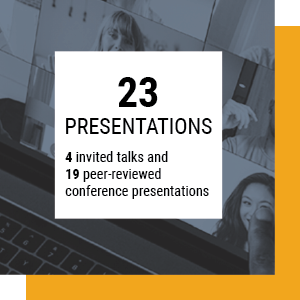
Despite the various cancelation and postponement of scientific conferences worldwide, ARiEAL researchers presented 19 peer-reviewed conference presentations and 4 invited talks virtually in 2021.
Featured below are a selection of these presentations:
Kučerová, I. & Szczegielniak, A. (2021, June). Underspecification of nominal functional categories in Slavic and Semitic. Olomouc Generative Syntax Colloquium. Olomouc, Czech Republic. (Delivered Online)
Pape, D., & Mercier, O. (2021, June). Perceptual cue weighting of intervocalic velar plosives in Canadian English. 4th Phonetics and Phonology Conference in Europe (PaPE). Barcelona, Spain. (Delivered Online)
Service, E., DeBorba, E., Lopez Ricote, A., & Horzum, M. (2021, November). Short-Term Memory for Patterns in Time and for Nonsense Sentences Predicts Learning of Foreign Words. 62nd Annual Meeting of the Psychonomic Society. New Orleans, USA. (Delivered Online)
View full list of 2021 presentations
Archibald, L. (2021, March & April). Criteria and crucial conversations about DLD (A two part series). Speech-Language and Audiology Canada. Ottawa, Canada. (Invited; Delivered Online) Connolly, J. (2021, March). Electrophysiological assessment of neurocognitive function in health and pathology: From Acquired Brain Injury to Post COVID Syndrome. Invited Lecturer at Centre for Ageing Studies, College of Humanities, University of Ghana. Accra, Ghana. (Invited; Delivered Online) Danielli, E., Stillo, D., Ho, R., DeMatteo, C., Hall, G.B., Bock, N., Connolly, J., & Noseworthy, M. (2021, May). Correlating concussion-related symptoms to the personalized MRI assessment of brain abnormalities in children. 2021 International Society of Magnetic Resonance in Medicine Annual Meeting. Vancouver, Canada. (Delivered Online) Ewers N., Hunt C.L., Mangold K., & Connolly J. (2021, June). Worth taking the hit? Understanding the effects of concussion and subconcussive impacts on cognitive health. Annual Canadian Psychological Association. Canada. (Delivered Online) Herrera-Diaz, A., Kolesar, R., Boshra, R., Reilly, J., Tavakoli, P., Pajankar, N., Lin, C., Bagheri, E., Morrison, H., & Connolly, J. (2021, July). Multivariate Decoding of Auditory Event-Related Potentials to Track Coma Progression. Virtual World Congress on Brain Injury. Alexandria, USA. (Delivered Online) Kučerová, I. (2021, September). Neuter is a lonely gender. Slavic Linguistics Society (SLS) 16. Champaign, IL, USA. (Invited; Delivered Online) Kučerová, I. & Szczegielniak, A. (2021, June). Underspecification of nominal functional categories in Slavic and Semitic. Olomouc Generative Syntax Colloquium. Olomouc, Czech Republic. (Delivered Online) Kučerová, I. & Szczegielniak, A. (2021, May). Remnant licensing and structural economy in VP ellipsis: Evidence from Czech. Annual Meeting of Formal Approaches to Slavic Linguistics. Cambridge, USA. (Delivered Online) Kuperman, V. (2021, June). How to study reading comprehension and fluency in the first and second language using eye-tracking data. 8th Summer NeuroLinguistics School. Moscow, Russia. (Invited; Delivered Online) Kuperman, V. (2021, May). What makes us proficient readers in a second language: new eye-tracking corpora. Invited Talk at the Department of Linguistics at Montclair State University. Montclair, USA. (Invited; Delivered Online) Kuperman, V. (2021, March). Reading proficiency in second language: new evidence from eye-tracking corpora. Invited Talk at the University of Belgrade. Belgrade, Serbia. (Invited; Delivered Online) Lorenc, A., Żygis, M., Pape, D., & Mik, L. (2021, September). Articulatory and acoustic variation in the realization of Polish retroflexes. 50th Poznań Linguistic Meeting (PLM). Poznań, Poland. (Delivered Online) Lorenc, A., Żygis, M., Pape, D., & Mik, L. (2021, September). Articulatory characteristics of Polish retroflex sibilants. Conference of the Commission for Phonetics and Phonology of Slavic Languages of the International Slavic Committee. Zagreb, Croatia. (Delivered Online) Mann, R., Acai, A., & Sonnadara, R. (2021, March). Data source prioritization among novice raters in competence committee decision making. 3rd Annual Ontario Student Medical Education Research Conference. Toronto, Canada. (Delivered Online) Mousapour, L., Dabagh, Y., Dhindsa, K., Reilly, J., Connolly, J., & Becker, S. (2021, February). EEG source space analysis for brain-computer interfaces. Vector Institute Research Symposium. Toronto, Canada. (Poster; Invited; Delivered Online) Pape, D., & Mercier, O. (2021, June). Perceptual cue weighting of intervocalic velar plosives in Canadian English. 4th Phonetics and Phonology Conference in Europe (PaPE). Barcelona, Spain. (Delivered Online) Rana, F. & Service, E. (2021, June). The building blocks of temporal variation in language processing. Canadian Society for Brain, Behaviour and Cognitive Science. Montreal, Canada. (Delivered Online) Reilly, J. (2021, June). Analysis of ERP data Using Principal Components in Time and Space. Presentation at the Coma Research Group. Hamilton, Canada. (Invited; Delivered Online) Schmidtke, D., Rahmanian, S., & Moro, A. (2021, November). Reading experience drives L2 reading development: a longitudinal study of EAL reading habits. Words in the World International Conference 2021. St. Catharines, Canada. (Delivered Online) Service, E., DeBorba, E., Lopez Ricote, A., & Horzum, M. (2021, November). Short-Term Memory for Patterns in Time and for Nonsense Sentences Predicts Learning of Foreign Words. 62nd Annual Meeting of the Psychonomic Society. New Orleans, USA. (Delivered Online) Service, E., DeBorba, E., Lopez Ricote, A., & Horzum, M. (2021, June). Individual differences in foreign word form learning: Roles for rhythm and STM for non-sentences. Canadian Society for Brain, Behaviour and Cognitive Science. Montreal, Canada. (Delivered Online) Weigel, C., Pape, D., & Stroińska, M. (2021, July). Applying Automatic Speech to Text in Academic Settings for the Deaf and Hard of Hearing. LACUS Virtual Conference. Toledo, USA. (Delivered Online) Weigel, C., Pape, D., & Stroińska, M. (2021, March). Applying Automatic Speech to Text in Academic Settings for the Deaf and Hard of Hearing. Current Research in Engineering, Science & Technology (CREST) Meeting. Hamilton, Canada. (Delivered Online)
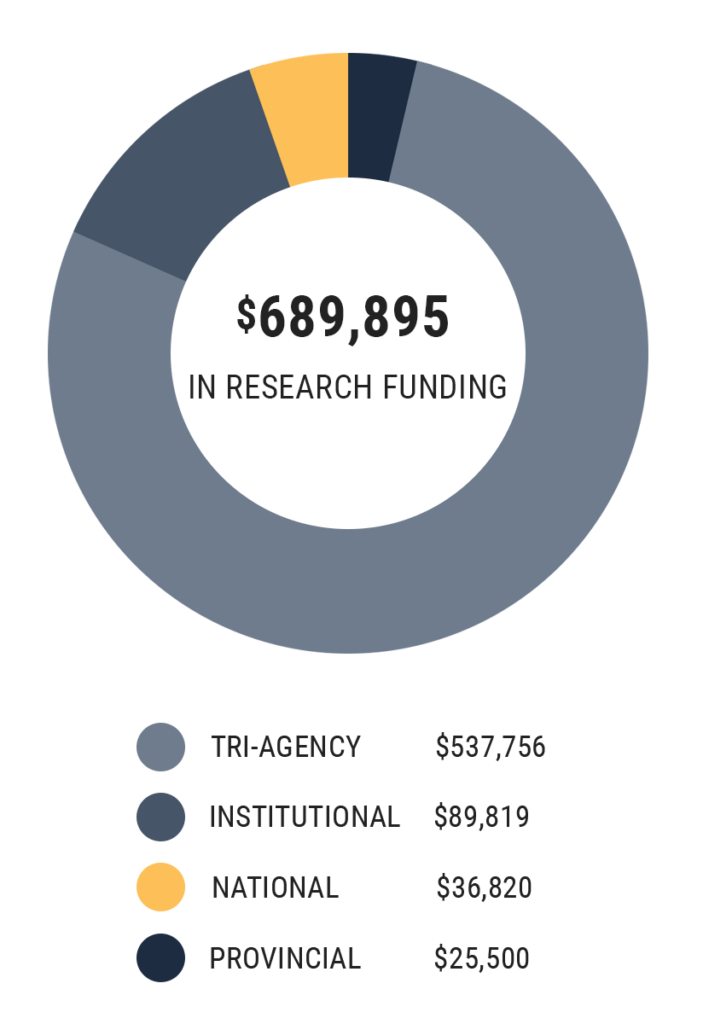
ARiEAL researchers received funding for 10 new research projects as Principal Investigators or Co-investigators in 2021. The total funding reached almost $700,000 dollars across these newly commenced projects.
Funding sources include the Social Sciences and Humanities Research Council (SSHRC), the Natural Sciences and Engineering Research Council of Canada (NSERC), and Mitacs, as well as various other funding agencies.
View full list of 2021 grants Anderson C., Bjorkman, B., Doner, J., Grant, M., Mills, T., Sanders, N., & Taniguchi, A. Essentials of Linguistics 2nd edition. eCampusOntario, $25,500, 2021-2022. Archibald, L. Determining the cognitive, linguistic, and input features influencing oral language processing. The Natural Sciences and Engineering Research Council of Canada, $140,000, 2021. Blundon, E., Krueger-Naug, A.M. & Connolly, J. Describing aspects of brain function at end of life. Dalhousie University, $60,000, 2021. Commanda, K. & Kučerová, I. Internship Award with Kahawi Theatre. Mitacs, $15,000, 2021. Kapczinski, F., Reilly, J., et al. The use of artificial intelligence to predict suicide attempts among youth: a machine learning approach. Social Sciences and Humanities Research Council, $247,088, 2021-2023. Kuperman, V. Understanding the impact of COVID-19 on reading comprehension in Canadian and US university students: a multi-componential approach. Social Sciences and Humanities Research Council, $38,835, 2021-2026. McNeill, K., Becker, S., & Sonnadara, R. Ontario’s digital research infrastructures needs assessment and capacity building. Mitacs, $15,000, 2021-2022. Peterson, D. & Sonnadara R. A Self-Directed Learning Tool for Orthopedics in Undergraduate Medical Education. McMaster University, $29,818.51, 2021. Service, E. & Connelly, C. The effects of working in a second language on strategic thinking. Social Sciences and Humanities Research Council, $150,668, 2021-2025. Tavakoli, P. & Connolly, J. Using electrophysiology to differentiate between disorders of consciousness. McMaster Arts Research Board, $6,820, 2021.
Impact
ARiEAL strives to expand its research reach to engage the broader scientific community and beyond. In 2021, we continued with our youth outreach initiative and hosted our first 3-week session on scientific journals and the peer-reviewed process for children and youth. All talks and events were held virtually in 2021 to ensure safety. Many of these are archived on our website to ensure easy access and greater knowledge dissemination.
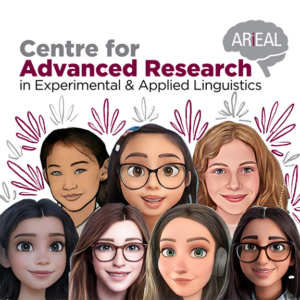
illustrated image of the inaugural cohort of young reviewers and their mentor (Image Credit: Vidhi Patel)
ARiEAL aims to engage children and youth in the culture of scientific research and higher education through meaningful activities. In 2021, we developed a repertoire of resource based on the model of the Frontiers for Young Minds, an open access scientific journal both reviewed by and designed for children and youth between 8-15 years of age. Our goal was to raise the awareness on scientific literacy by introducing the scientific journals and the peer-review process to the next generation. The project was funded by the MacPherson Institute Student Partner Program and carried out collaboratively by ARiEAL manager, Chia-Yu Lin, a MacPherson student partner, Vidhi Patel, and a team of ARiEAL trainees, Dr. Paniz Tavakoli, Deewa Anwarzi, Nadia Lana, Netri Pajankar, and Caryn Qian. After two rounds of pilot test with children and youth from the local community, the team successfully hosted an inaugural 3-week session where the ARiEAL alumna, Dr. Constance Imbault, led 9 children through the journey of understanding the scientific journals and peer-review process. Together, they then reviewed a scientific manuscript and offered insightful feedback to the authors. This manuscript is expected to be published in the Frontiers for Young Minds in 2022.
ARiEAL trainees, Emilie Altman (Reading Lab), Sukhman Baath (Turkstra Lab), Audrey Ho (Syntax Lab), Monika Krizic (Phonetics Lab), Bre-Anna Owusu (Language, Memory and Brain Lab – Behavioural), Netri Pajankar (Language, Memory and Brain Lab – EEG), Sara Pearsell (Phonetics Lab), and Caryn Qian (Language, Memory and Brain Lab – EEG), worked collaboratively and delivered engaging virtual sessions at the GenSTEM Conference for high school students organized by McMaster’s Women in Science and Engineering (WISE) initiative in December 2021.
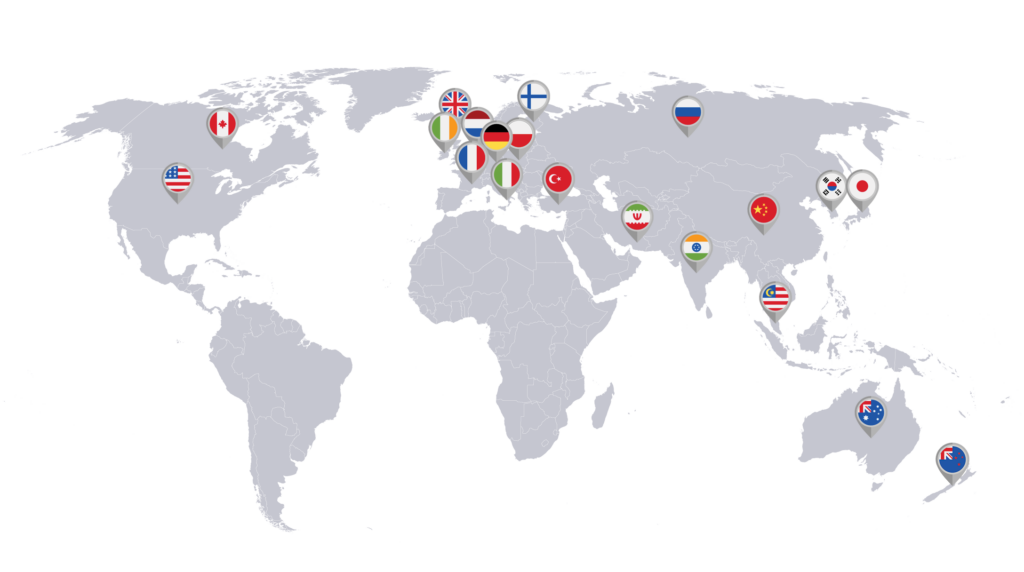
Towards our goal as a resource hub, the ARiEAL website continues to attract curiosity from people around the world as shown by almost 10,000 visitors from 101 countries in 2021 alone. This map highlights the top 20 countries from which our website visitors come. During 2021 our official Twitter handle reached over 110,000 impressions, with 126 tweets and retweets, and exceeded 3,500 engagement counts. Our Instagram account, now with 349 followers, has continued to foster engagement, specifically with high school and undergraduate students. One of the key initiatives on ARiEAL Instagram is the Spotlight series where our researchers, students and staff were being featured to share their research and fun facts about themselves! The year 2021 has continued to inform us the importance of knowledge mobilization and engagement through virtual platforms, and we will maintain this endeavour into the future.
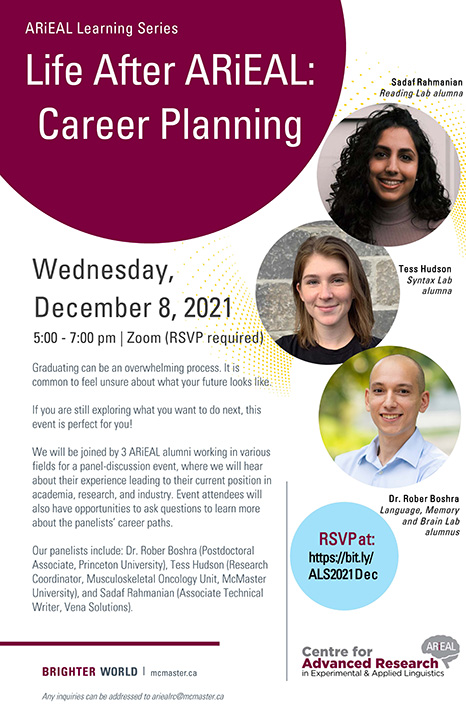
Event poster – Panel discussion on career planning organized by ARiEAL Operations Team. (Image provided by Chia-Yu Lin)
The ARiEAL Speaker Series established in late 2019 continues to host renowned researchers, including ARiEAL’s very own Scientific Advisory Committee members, Drs. Denise Klein, Sid Segalowitz, and Penny Pexman, to share their wealth of knowledge. ARiEAL also offers various opportunities for trainees of all levels to develop and refine their research skills through the ARiEAL Learning Series on topics such as how to captivate online audiences. Recorded Speaker & Learning Series events are made available on the ARiEAL Archive.
View full list of 2021 events SPEAKER SERIES Dr. Tania Ionin, Professor, Department of Linguistics, University of Illinois at Urbana-Champaign: Champaign, USA. Investigations into word order and information structure in the Russian of heritage speakers and second language learners. December 3, 2021. Dr. Penny Pexman, Professor, Department of Psychology, University of Calgary: Calgary, Canada. Grasping Word Meaning: Sensorimotor and Emotion Effects in Lexical Development. June 10, 2021. Dr. Sid Segalowitz, Professor, Department of Psychology, Brock University: Niagara, Canada. Accessing words in the Mental Lexicon with ERPs: Are words ‘perceived’ in the same way as faces and objects? May 21, 2021. Dr. Denise Klein, Associate Professor, Department of Neurology and Neurosurgery, McGill University: Montreal, Canada. Language experience and its role in changing our brains. April 8, 2021. Prof. Loretta Ross, Visiting Associate Professor, Program for the Study of Women and Gender, Smith College: Northampton, USA. Calling In the Calling Out Culture. March 25, 2021. LEARNING SERIES Dr. Rober Boshra, Postdoctoral Associate, Princeton Neuroscience Institute, Princeton University: Princeton, America; Tess Hudson, Research Coordinator, Musculoskeletal Oncology Unit, McMaster University: Hamilton, Canada; & Sadaf Rahmanian, Associate Technical Writer, Vena Solutions: Toronto, Canada. Life After ARiEAL – Career Planning. December 08, 2021. Shahithra Kirubalingam, Master’s Student, Faculty of Health Sciences, McMaster University: Hamilton, Canada; Carla Weigel, ARiEAL Alumna, Department of Linguistics and Languages, McMaster University: Hamilton, Canada; & Nadia Lana, PhD Student, Department of Linguistics and Languages, McMaster University: Hamilton, Canada. Graduate School Q & A. October 21, 2021. Rachelle Ho, PhD Student, Department of Psychology, Neuroscience & Behaviour, McMaster University: Hamilton, Canada. Finding an Academic Supervisor. July 22, 2021. Rachelle Ho, PhD Student, Department of Psychology, Neuroscience & Behaviour, McMaster University: Hamilton, Canada. Captivating Your Online Audience. June 28, 2021. Sheereen Harris, PhD Candidate, Department of Kinesiology, McMaster University: Hamilton, Canada. How to Stay Motivated and Active During the COVID-19 Pandemic. February 21, 2021.
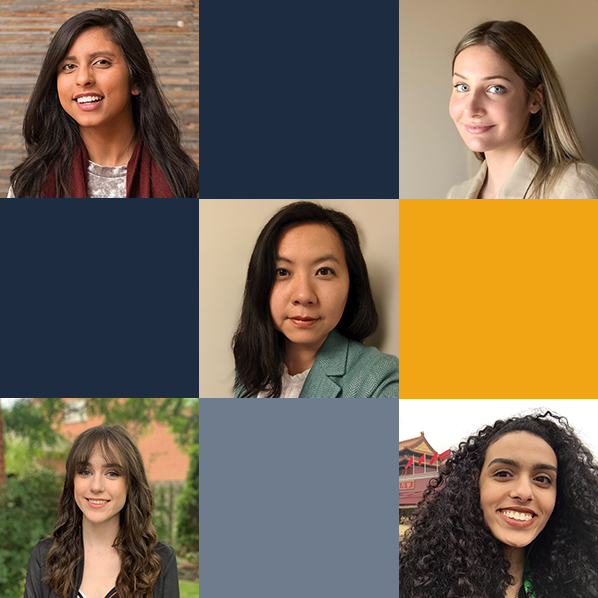
The ARiEAL Operations Team 2021-2022 (Images provided by each AOT member)
ARiEAL established a trainee-based operations team (hereafter referred to as AOT) in 2020. The trainees work collaboratively with ARiEAL manager, Chia-Yu Lin, to support ARiEAL’s effort on event planning and knowledge mobilization. The AOT operates on a one-year renewable term and provides hands-on opportunities for undergraduate and graduate trainees to not only participate but also lead the endeavours in knowledge mobilization and the planning of various events. ARiEAL was able to continue expanding its reach through Twitter and Instagram with the leadership demonstrated by Nadia Lana and Mariam Bekhet (Knowledge Mobilization Coordinator and Assistant, respectively). Despite the continued lockdown caused by the COVID-19 pandemic, Sukhman Baath and Fiza Ahmad (Learning Series Coordinators) braved the challenges and brought us events such as “How to Captivate Online Audience” and “Life After ARiEAL – Career Planning”. ARiEAL’s own GatherTown equipped with mini games, organized by Catherine Bosyj (Social Coordinator), offered the much-needed breaks that the ARiEAL community can enjoy and connect with one another.
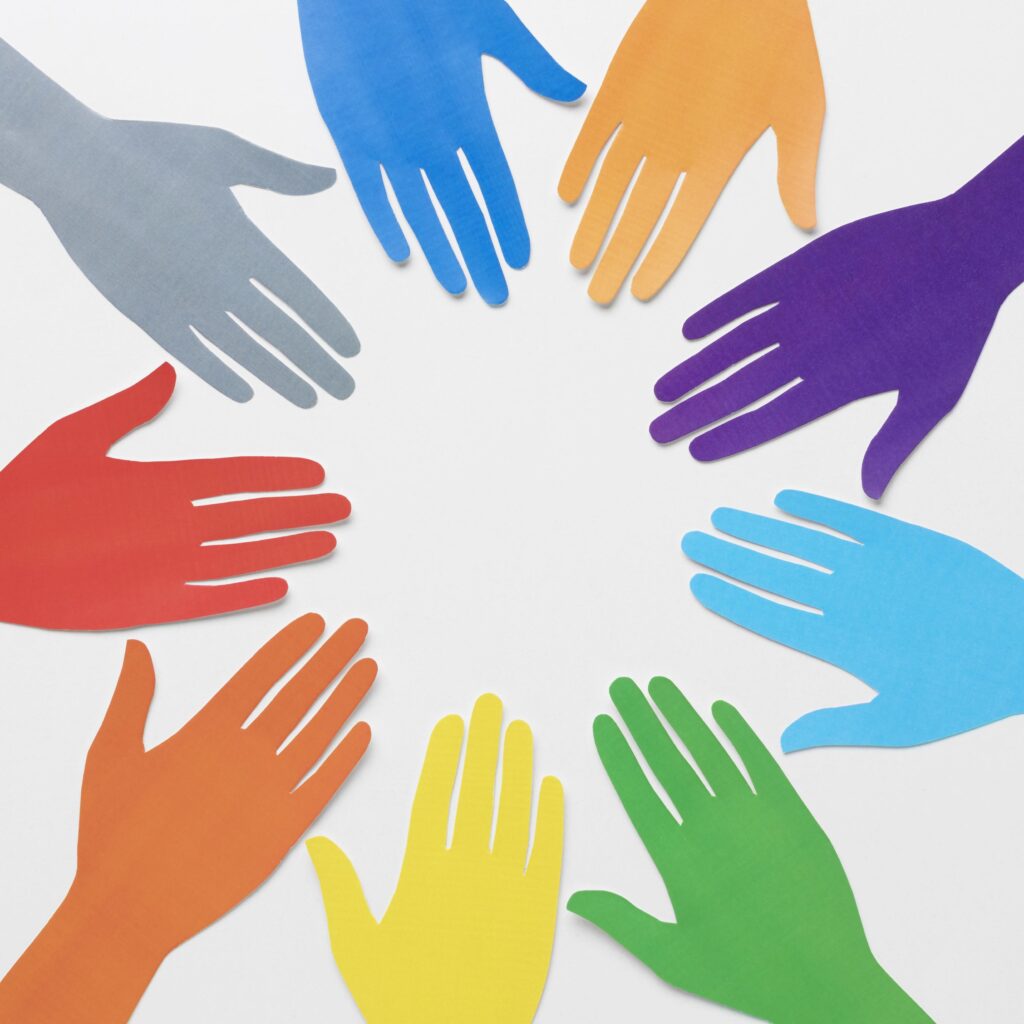
Image by Freepik
Under the new directorship of Dr. Ivona Kučerová (2021-2026; 5-year renewable term), first and foremost, ARiEAL aims to refine its values, mission and vision statements and to implement a revised plan to actively engage international trainees/scholars especially those from the five countries identified in the 2016 Senate approved proposal for the establishment of ARiEAL (i.e., Brazil, Cuba, Ghana, Jamaica, and Nigeria). The planning of these initiatives started in 2021 and are expected to be completed in 2022. ARiEAL strives to incorporate the principles of Equity, Diversity and Inclusion at each stage of planning.

illustrated image of the inaugural cohort of young reviewers and their mentor (Image Credit: Vidhi Patel)
ARiEAL aims to engage children and youth in the culture of scientific research and higher education through meaningful activities. In 2021, we developed a repertoire of resource based on the model of the Frontiers for Young Minds, an open access scientific journal both reviewed by and designed for children and youth between 8-15 years of age. Our goal was to raise the awareness on scientific literacy by introducing the scientific journals and the peer-review process to the next generation. The project was funded by the MacPherson Institute Student Partner Program and carried out collaboratively by ARiEAL manager, Chia-Yu Lin, a MacPherson student partner, Vidhi Patel, and a team of ARiEAL trainees, Dr. Paniz Tavakoli, Deewa Anwarzi, Nadia Lana, Netri Pajankar, and Caryn Qian. After two rounds of pilot test with children and youth from the local community, the team successfully hosted an inaugural 3-week session where the ARiEAL alumna, Dr. Constance Imbault, led 9 children through the journey of understanding the scientific journals and peer-review process. Together, they then reviewed a scientific manuscript and offered insightful feedback to the authors. This manuscript is expected to be published in the Frontiers for Young Minds in 2022.
ARiEAL trainees, Emilie Altman (Reading Lab), Sukhman Baath (Turkstra Lab), Audrey Ho (Syntax Lab), Monika Krizic (Phonetics Lab), Bre-Anna Owusu (Language, Memory and Brain Lab – Behavioural), Netri Pajankar (Language, Memory and Brain Lab – EEG), Sara Pearsell (Phonetics Lab), and Caryn Qian (Language, Memory and Brain Lab – EEG), worked collaboratively and delivered engaging virtual sessions at the GenSTEM Conference for high school students organized by McMaster’s Women in Science and Engineering (WISE) initiative in December 2021.

Towards our goal as a resource hub, the ARiEAL website continues to attract curiosity from people around the world as shown by almost 10,000 visitors from 101 countries in 2021 alone. This map highlights the top 20 countries from which our website visitors come. During 2021 our official Twitter handle reached over 110,000 impressions, with 126 tweets and retweets, and exceeded 3,500 engagement counts. Our Instagram account, now with 349 followers, has continued to foster engagement, specifically with high school and undergraduate students. One of the key initiatives on ARiEAL Instagram is the Spotlight series where our researchers, students and staff were being featured to share their research and fun facts about themselves! The year 2021 has continued to inform us the importance of knowledge mobilization and engagement through virtual platforms, and we will maintain this endeavour into the future.

Event poster – Panel discussion on career planning organized by ARiEAL Operations Team. (Image provided by Chia-Yu Lin)
The ARiEAL Speaker Series established in late 2019 continues to host renowned researchers, including ARiEAL’s very own Scientific Advisory Committee members, Drs. Denise Klein, Sid Segalowitz, and Penny Pexman, to share their wealth of knowledge. ARiEAL also offers various opportunities for trainees of all levels to develop and refine their research skills through the ARiEAL Learning Series on topics such as how to captivate online audiences. Recorded Speaker & Learning Series events are made available on the ARiEAL Archive.
View full list of 2021 events SPEAKER SERIES Dr. Tania Ionin, Professor, Department of Linguistics, University of Illinois at Urbana-Champaign: Champaign, USA. Investigations into word order and information structure in the Russian of heritage speakers and second language learners. December 3, 2021. Dr. Penny Pexman, Professor, Department of Psychology, University of Calgary: Calgary, Canada. Grasping Word Meaning: Sensorimotor and Emotion Effects in Lexical Development. June 10, 2021. Dr. Sid Segalowitz, Professor, Department of Psychology, Brock University: Niagara, Canada. Accessing words in the Mental Lexicon with ERPs: Are words ‘perceived’ in the same way as faces and objects? May 21, 2021. Dr. Denise Klein, Associate Professor, Department of Neurology and Neurosurgery, McGill University: Montreal, Canada. Language experience and its role in changing our brains. April 8, 2021. Prof. Loretta Ross, Visiting Associate Professor, Program for the Study of Women and Gender, Smith College: Northampton, USA. Calling In the Calling Out Culture. March 25, 2021. LEARNING SERIES Dr. Rober Boshra, Postdoctoral Associate, Princeton Neuroscience Institute, Princeton University: Princeton, America; Tess Hudson, Research Coordinator, Musculoskeletal Oncology Unit, McMaster University: Hamilton, Canada; & Sadaf Rahmanian, Associate Technical Writer, Vena Solutions: Toronto, Canada. Life After ARiEAL – Career Planning. December 08, 2021. Shahithra Kirubalingam, Master’s Student, Faculty of Health Sciences, McMaster University: Hamilton, Canada; Carla Weigel, ARiEAL Alumna, Department of Linguistics and Languages, McMaster University: Hamilton, Canada; & Nadia Lana, PhD Student, Department of Linguistics and Languages, McMaster University: Hamilton, Canada. Graduate School Q & A. October 21, 2021. Rachelle Ho, PhD Student, Department of Psychology, Neuroscience & Behaviour, McMaster University: Hamilton, Canada. Finding an Academic Supervisor. July 22, 2021. Rachelle Ho, PhD Student, Department of Psychology, Neuroscience & Behaviour, McMaster University: Hamilton, Canada. Captivating Your Online Audience. June 28, 2021. Sheereen Harris, PhD Candidate, Department of Kinesiology, McMaster University: Hamilton, Canada. How to Stay Motivated and Active During the COVID-19 Pandemic. February 21, 2021.

The ARiEAL Operations Team 2021-2022 (Images provided by each AOT member)
ARiEAL established a trainee-based operations team (hereafter referred to as AOT) in 2020. The trainees work collaboratively with ARiEAL manager, Chia-Yu Lin, to support ARiEAL’s effort on event planning and knowledge mobilization. The AOT operates on a one-year renewable term and provides hands-on opportunities for undergraduate and graduate trainees to not only participate but also lead the endeavours in knowledge mobilization and the planning of various events. ARiEAL was able to continue expanding its reach through Twitter and Instagram with the leadership demonstrated by Nadia Lana and Mariam Bekhet (Knowledge Mobilization Coordinator and Assistant, respectively). Despite the continued lockdown caused by the COVID-19 pandemic, Sukhman Baath and Fiza Ahmad (Learning Series Coordinators) braved the challenges and brought us events such as “How to Captivate Online Audience” and “Life After ARiEAL – Career Planning”. ARiEAL’s own GatherTown equipped with mini games, organized by Catherine Bosyj (Social Coordinator), offered the much-needed breaks that the ARiEAL community can enjoy and connect with one another.

Image by Freepik
Under the new directorship of Dr. Ivona Kučerová (2021-2026; 5-year renewable term), first and foremost, ARiEAL aims to refine its values, mission and vision statements and to implement a revised plan to actively engage international trainees/scholars especially those from the five countries identified in the 2016 Senate approved proposal for the establishment of ARiEAL (i.e., Brazil, Cuba, Ghana, Jamaica, and Nigeria). The planning of these initiatives started in 2021 and are expected to be completed in 2022. ARiEAL strives to incorporate the principles of Equity, Diversity and Inclusion at each stage of planning.
The Centre
Founded in late 2016, ARiEAL Research Centre celebrated its fifth full calendar year since its inception in 2021. We are proud of the mentorship demonstrated by our researchers and our amazing trainees of all levels.
DIRECTOR (from July 1, 2021 onwards)
Dr. Ivona Kučerová (Department of Linguistics and Languages, McMaster University)
FOUNDING DIRECTOR
Dr. John Connolly (Department of Linguistics and Languages, McMaster University)
ASSOCIATE DIRECTOR
Dr. Anna Moro (Department of Linguistics and Languages, McMaster University)
FULL MEMBERS
Dr. Catherine Anderson (Department of Linguistics and Languages, McMaster University)
Dr. Sue Becker (Department of Psychology, Neuroscience & Behaviour, McMaster University)
Dr. Marc Joanisse (Department of Psychology, University of Western Ontario)
Dr. Victor Kuperman (Department of Linguistics and Languages, McMaster University)
Dr. Michael Noseworthy (Department of Electrical and Computer Engineering, McMaster University)
Dr. Daniel Pape (Department of Linguistics and Languages, McMaster University)
Dr. Jim Reilly (Department of Electrical and Computer Engineering, McMaster University)
Dr. Elisabet Service (Department of Linguistics and Languages, McMaster University)
Dr. Lyn Turkstra (School of Rehabilitation Science, McMaster University)
ASSOCIATE MEMBERS
Dr. Lisa Archibald (Department of Psychology, University of Western Ontario)
Prof. Carol DeMatteo (School of Rehabilitation Science, McMaster University)
Paul Grunthal (McMaster Industry Liaison Office, McMaster University)
Dr. Ranil Sonnadara (Department of Surgery, McMaster University)
POSTDOCTORAL FELLOWS
Dr. Elham Bagheri (Co-supervised by Dr. John Connolly and Dr. Jim Reilly)
Dr. Jason Bernard (Supervised by Dr. Ranil Sonnadara)
Dr. Pan Liu (Co-supervised by Dr. Marc Joanisse and Dr. Elizabeth Hayden)
Dr. Lien Peters (Co-supervised by Dr. Marc Joanisse and Dr. Daniel Ansari)
Dr. Theresa Pham (Supervised by Dr. Lisa Archibald)
Dr. Daniel Schmidtke (Supervised by Dr. Anna Moro)
Dr. Mojtaba Soltanlou (Co-supervised by Dr. Marc Joanisse and Dr. Daniel Ansari)
Dr. Paniz Tavakoli* (Supervised by Dr. John Connolly)
Dr. Melissa Troyer (Co-supervised by Dr. Marc Joanisse and Dr. Ken McRae)
PHD STUDENTS
Hubert Banville (Supervised by Dr. Sue Becker)
Rachel Benninger (Supervised by Dr. Lisa Archibald)
Leah Brainin (Supervised by Dr. Marc Joanisse)
Fiona Campbell (Supervised by Dr. Lyn Turkstra)
Mohammad Chaposhloo (Supervised by Dr. Sue Becker)
Melda Coşkun (Supervised by Dr. Victor Kuperman)
Alexandra Cross* (Co-supervised by Dr. Marc Joanisse and Dr. Lisa Archibald)
Ethan Danielli (Supervised by Dr. Michael Noseworthy)
Niloufar Dezfuly (Supervised by Dr. Lisa Archibald)
Jovan Eranovic (Co-supervised by Dr. Daniel Pape and Dr. Magda Stroińska)
Jordan Gallant (Supervised by Dr. Elisabet Service)
Rudaina Hamed (Co-supervised by Dr. Victor Kuperman and Dr. Anna Moro)
Adianes Herrera (Supervised by Dr. John Connolly)
Lisa Kakonge (Supervised by Dr. Lyn Turkstra)
Portia Kalun (Supervised by Dr. Ranil Sonnadara)
Isaac Kinley (Supervised by Dr. Sue Becker)
Alyssa Kuciak (Supervised by Dr. Lisa Archibald)
Pekka Lahti-Nuuttila (Co-supervised by Dr. Elisabet Service and Dr. Marja Laasonen)
Nadia Lana (Supervised by Dr. Victor Kuperman)
Yarden Levy (Co-supervised by Dr. Sue Becker and Dr. Margaret McKinnon)
Chenglin Lou (Supervised by Dr. Marc Joanisse)
Kestrel McNeill (Supervised by Dr. Ranil Sonnadara)
Martyna Michalska (Co-supervised by Dr. Daniel Pape and Dr. Marzena Żygis)
Allison Mizzi (Co-supervised by Dr. Sue Becker and Dr. Margaret McKinnon)
Christine Moreau (Supervised by Dr. Marc Joanisse)
Kelly Nisbet* (Supervised by Dr. Victor Kuperman)
Gaisha Oralova (Co-supervised by Dr. John Connolly and Dr. Victor Kuperman)
Bre-Anna Owusu (Supervised by Dr. Elisabet Service)
Kaitlyn Parks (Supervised by Dr. Marc Joanisse)
Sara Pearsell (Supervised by Dr. Daniel Pape)
Theresa Pham* (Supervised by Dr. Lisa Archibald)
Jade Plym (Co-supervised by Dr. Elisabet Service and Dr. Marja Laasonen)
Paul Polak (Supervised by Dr. Michael Noseworthy)
Adam Politis (Supervised by Dr. Lyn Turkstra)
Frederico Prado (Supervised by Dr. Ivona Kučerová)
Fareeha Rana (Co-supervised by Dr. John Connolly and Dr. Elisabet Service)
Saurabh Shaw* (Supervised by Dr. Sue Becker)
Nicolas Simard (Co-supervised by Dr. Michael Noseworthy and Dr. Jim Reilly)
Selena Singh (Supervised by Dr. Sue Becker)
Lauren Smail (Co-supervised by Dr. Sue Becker and Dr. Ranil Sonnadara)
Ali Torabi (Supervised by Dr. Jim Reilly)
Maryam Torabi (Co-supervised by Dr. Jim Reilly and Dr. Shahram Shirani)
Meghan Vollebregt (Supervised by Dr. Lisa Archibald)
Chelsea Whitwell (Supervised by Dr. Elisabet Service)
Aya Zarka (Supervised by Dr. Ivona Kučerová)
MASTER’S STUDENTS
Emilie Altman (Supervised by Dr. Victor Kuperman)
Lauren Anderson (Supervised by Dr. Michael Noseworthy)
Deewa Anwarzi (Co-supervised by Dr. Sue Becker and Dr. Sukh Obhi)
Kaitlyn Battershill (Supervised by Dr. Victor Kuperman)
Jean-François Berthiaume (Supervised by Dr. Daniel Pape)
Kurtis Commanda (Supervised by Dr. Ivona Kučerová)
Michael Fisher* (Supervised by Prof. Carol DeMatteo)
Noah Frank (Supervised by Dr. Michael Noseworthy)
Ashley Gilbank (Supervised by Dr. Michael Noseworthy)
Daniil Gnetov (Supervised by Dr. Victor Kuperman)
Meagan Hann-Leger (Supervised by Dr. Ivona Kučerová)
Farah Hasan (Supervised by Dr. Ranil Sonnadara)
Lan (Conan) Hu (Supervised by Dr. Elisabet Service)
Megan Karabin (Supervised by Dr. Victor Kuperman)
Alish Kocz* (Supervised by Dr. Ivona Kučerová)
Monika Krizic (Supervised by Dr. Daniel Pape)
Nadia Lana* (Supervised by Dr. Victor Kuperman)
Dakyung (Rachel) Lim (Co-supervised by Dr. Daniel Pape and Dr. Magda Stroinska)
Gwenyth Lu (Supervised by Dr. John Connolly)
Neil MacPhee (Supervised by Dr. Michael Noseworthy)
Kiersten Mangold* (Supervised by Dr. John Connolly)
Brian McCrindle (Supervised by Dr. Michael Noseworthy)
Kestrel McNeill* (Supervised by Dr. Ranil Sonnadara)
Leila Mousapour* (Co-supervised by Dr. Sue Becker and Dr. John Connolly)
Netri Pajankar (Supervised by Dr. John Connolly)
Pranav Rawal (Supervised by Dr. Michael Noseworthy)
Natalie Romaniuk (Supervised by Dr. Carol DeMatteo)
Ethan Samson (Supervised by Dr. Michael Noseworthy)
Mahnaz Tajik (Supervised by Dr. Michael Noseworthy)
Carla Weigel* (Co-supervised by Dr. Daniel Pape and Dr. Magda Stroinska)
Heather Wild (Supervised by Dr. Victor Kuperman)
Ziqi (Jordan) Yang (Supervised by Dr. Elisabet Service)
Zhongda Zhang (Supervised by Dr. Jim Reilly)
Calvin Zhu (Supervised by Dr. Michael Noseworthy)
*Completed program in 2021
MANAGER, DEVELOPMENT & RESEARCH
Chia-Yu Lin
STUDENT ASSISTANTS
Ashumi Doshi (January – April 2021)
Vidhi Patel (May – December 2021)
OPERATIONS TEAM
Knowledge Mobilization Coordinators/Assistant
Deewa Anwarzi (January – April 2021)
Mohammad Chaposhloo (January – April 2021)
Nadia Lana (April – December 2021)
Mariam Bekhet (April – December 2021)
Learning Series Coordinators
Mariam Bekhet (January – April 2021)
Kelly Nisbet (January – April 2021)
Sukhman Baath (April – December 2021)
Fiza Ahmad (April – December 2021)
Social Coordinators
Sukhman Baath (January – April 2021)
Carla Weigel (January – April 2021)
Catherine Bosyj (April – December 2021)
Speaker Series Coordinator
Leila Mousapour (January – April 2021)
Dr. Sylvain Baillet (McGill University)
Dr. Laurie Feldman (University at Albany)
Dr. Denise Klein (McGill University)
Dr. Ken McRae (University of Western Ontario)
Dr. Penny Pexman (University of Calgary)
Dr. Ken Pugh (Haskins Laboratories)
Dr. Sid Segalowitz (Brock University)
Dr. Jon Sprouse (University of Connecticut)
Bundled Arrows Inc., Niagara Falls, NY, United States
Centro de Ciencia Cognitiva (C3), Madrid, Spain
Haskins Laboratories, New Haven, Connecticut, USA
Khovd State University (Department of Foreign Languages and Culture Studies, School of Social Sciences and Humanities), Khovd, Mongolia
Onkwawenna Kentyohkwa, Ohsweken, ON, Canada
Twatati Oneida Language Committee, Southwold, ON, Canada
University of Turku (Department of Psychology and Speech-Language Pathology), Turku, Finland
Words in the World (WoW), Partnership Grant funded by the Social Sciences and Humanities Research Council of Canada (SSHRC), Canada
DIRECTOR (from July 1, 2021 onwards)
Dr. Ivona Kučerová (Department of Linguistics and Languages, McMaster University)
FOUNDING DIRECTOR
Dr. John Connolly (Department of Linguistics and Languages, McMaster University)
ASSOCIATE DIRECTOR
Dr. Anna Moro (Department of Linguistics and Languages, McMaster University)
FULL MEMBERS
Dr. Catherine Anderson (Department of Linguistics and Languages, McMaster University)
Dr. Sue Becker (Department of Psychology, Neuroscience & Behaviour, McMaster University)
Dr. Marc Joanisse (Department of Psychology, University of Western Ontario)
Dr. Victor Kuperman (Department of Linguistics and Languages, McMaster University)
Dr. Michael Noseworthy (Department of Electrical and Computer Engineering, McMaster University)
Dr. Daniel Pape (Department of Linguistics and Languages, McMaster University)
Dr. Jim Reilly (Department of Electrical and Computer Engineering, McMaster University)
Dr. Elisabet Service (Department of Linguistics and Languages, McMaster University)
Dr. Lyn Turkstra (School of Rehabilitation Science, McMaster University)
ASSOCIATE MEMBERS
Dr. Lisa Archibald (Department of Psychology, University of Western Ontario)
Prof. Carol DeMatteo (School of Rehabilitation Science, McMaster University)
Paul Grunthal (McMaster Industry Liaison Office, McMaster University)
Dr. Ranil Sonnadara (Department of Surgery, McMaster University)
POSTDOCTORAL FELLOWS
Dr. Elham Bagheri (Co-supervised by Dr. John Connolly and Dr. Jim Reilly)
Dr. Jason Bernard (Supervised by Dr. Ranil Sonnadara)
Dr. Pan Liu (Co-supervised by Dr. Marc Joanisse and Dr. Elizabeth Hayden)
Dr. Lien Peters (Co-supervised by Dr. Marc Joanisse and Dr. Daniel Ansari)
Dr. Theresa Pham (Supervised by Dr. Lisa Archibald)
Dr. Daniel Schmidtke (Supervised by Dr. Anna Moro)
Dr. Mojtaba Soltanlou (Co-supervised by Dr. Marc Joanisse and Dr. Daniel Ansari)
Dr. Paniz Tavakoli* (Supervised by Dr. John Connolly)
Dr. Melissa Troyer (Co-supervised by Dr. Marc Joanisse and Dr. Ken McRae)
PHD STUDENTS
Hubert Banville (Supervised by Dr. Sue Becker)
Rachel Benninger (Supervised by Dr. Lisa Archibald)
Leah Brainin (Supervised by Dr. Marc Joanisse)
Fiona Campbell (Supervised by Dr. Lyn Turkstra)
Mohammad Chaposhloo (Supervised by Dr. Sue Becker)
Melda Coşkun (Supervised by Dr. Victor Kuperman)
Alexandra Cross* (Co-supervised by Dr. Marc Joanisse and Dr. Lisa Archibald)
Ethan Danielli (Supervised by Dr. Michael Noseworthy)
Niloufar Dezfuly (Supervised by Dr. Lisa Archibald)
Jovan Eranovic (Co-supervised by Dr. Daniel Pape and Dr. Magda Stroińska)
Jordan Gallant (Supervised by Dr. Elisabet Service)
Rudaina Hamed (Co-supervised by Dr. Victor Kuperman and Dr. Anna Moro)
Adianes Herrera (Supervised by Dr. John Connolly)
Lisa Kakonge (Supervised by Dr. Lyn Turkstra)
Portia Kalun (Supervised by Dr. Ranil Sonnadara)
Isaac Kinley (Supervised by Dr. Sue Becker)
Alyssa Kuciak (Supervised by Dr. Lisa Archibald)
Pekka Lahti-Nuuttila (Co-supervised by Dr. Elisabet Service and Dr. Marja Laasonen)
Nadia Lana (Supervised by Dr. Victor Kuperman)
Yarden Levy (Co-supervised by Dr. Sue Becker and Dr. Margaret McKinnon)
Chenglin Lou (Supervised by Dr. Marc Joanisse)
Kestrel McNeill (Supervised by Dr. Ranil Sonnadara)
Martyna Michalska (Co-supervised by Dr. Daniel Pape and Dr. Marzena Żygis)
Allison Mizzi (Co-supervised by Dr. Sue Becker and Dr. Margaret McKinnon)
Christine Moreau (Supervised by Dr. Marc Joanisse)
Kelly Nisbet* (Supervised by Dr. Victor Kuperman)
Gaisha Oralova (Co-supervised by Dr. John Connolly and Dr. Victor Kuperman)
Bre-Anna Owusu (Supervised by Dr. Elisabet Service)
Kaitlyn Parks (Supervised by Dr. Marc Joanisse)
Sara Pearsell (Supervised by Dr. Daniel Pape)
Theresa Pham* (Supervised by Dr. Lisa Archibald)
Jade Plym (Co-supervised by Dr. Elisabet Service and Dr. Marja Laasonen)
Paul Polak (Supervised by Dr. Michael Noseworthy)
Adam Politis (Supervised by Dr. Lyn Turkstra)
Frederico Prado (Supervised by Dr. Ivona Kučerová)
Fareeha Rana (Co-supervised by Dr. John Connolly and Dr. Elisabet Service)
Saurabh Shaw* (Supervised by Dr. Sue Becker)
Nicolas Simard (Co-supervised by Dr. Michael Noseworthy and Dr. Jim Reilly)
Selena Singh (Supervised by Dr. Sue Becker)
Lauren Smail (Co-supervised by Dr. Sue Becker and Dr. Ranil Sonnadara)
Ali Torabi (Supervised by Dr. Jim Reilly)
Maryam Torabi (Co-supervised by Dr. Jim Reilly and Dr. Shahram Shirani)
Meghan Vollebregt (Supervised by Dr. Lisa Archibald)
Chelsea Whitwell (Supervised by Dr. Elisabet Service)
Aya Zarka (Supervised by Dr. Ivona Kučerová)
MASTER’S STUDENTS
Emilie Altman (Supervised by Dr. Victor Kuperman)
Lauren Anderson (Supervised by Dr. Michael Noseworthy)
Deewa Anwarzi (Co-supervised by Dr. Sue Becker and Dr. Sukh Obhi)
Kaitlyn Battershill (Supervised by Dr. Victor Kuperman)
Jean-François Berthiaume (Supervised by Dr. Daniel Pape)
Kurtis Commanda (Supervised by Dr. Ivona Kučerová)
Michael Fisher* (Supervised by Prof. Carol DeMatteo)
Noah Frank (Supervised by Dr. Michael Noseworthy)
Ashley Gilbank (Supervised by Dr. Michael Noseworthy)
Daniil Gnetov (Supervised by Dr. Victor Kuperman)
Meagan Hann-Leger (Supervised by Dr. Ivona Kučerová)
Farah Hasan (Supervised by Dr. Ranil Sonnadara)
Lan (Conan) Hu (Supervised by Dr. Elisabet Service)
Megan Karabin (Supervised by Dr. Victor Kuperman)
Alish Kocz* (Supervised by Dr. Ivona Kučerová)
Monika Krizic (Supervised by Dr. Daniel Pape)
Nadia Lana* (Supervised by Dr. Victor Kuperman)
Dakyung (Rachel) Lim (Co-supervised by Dr. Daniel Pape and Dr. Magda Stroinska)
Gwenyth Lu (Supervised by Dr. John Connolly)
Neil MacPhee (Supervised by Dr. Michael Noseworthy)
Kiersten Mangold* (Supervised by Dr. John Connolly)
Brian McCrindle (Supervised by Dr. Michael Noseworthy)
Kestrel McNeill* (Supervised by Dr. Ranil Sonnadara)
Leila Mousapour* (Co-supervised by Dr. Sue Becker and Dr. John Connolly)
Netri Pajankar (Supervised by Dr. John Connolly)
Pranav Rawal (Supervised by Dr. Michael Noseworthy)
Natalie Romaniuk (Supervised by Dr. Carol DeMatteo)
Ethan Samson (Supervised by Dr. Michael Noseworthy)
Mahnaz Tajik (Supervised by Dr. Michael Noseworthy)
Carla Weigel* (Co-supervised by Dr. Daniel Pape and Dr. Magda Stroinska)
Heather Wild (Supervised by Dr. Victor Kuperman)
Ziqi (Jordan) Yang (Supervised by Dr. Elisabet Service)
Zhongda Zhang (Supervised by Dr. Jim Reilly)
Calvin Zhu (Supervised by Dr. Michael Noseworthy)
*Completed program in 2021
MANAGER, DEVELOPMENT & RESEARCH
Chia-Yu Lin
STUDENT ASSISTANTS
Ashumi Doshi (January – April 2021)
Vidhi Patel (May – December 2021)
OPERATIONS TEAM
Knowledge Mobilization Coordinators/Assistant
Deewa Anwarzi (January – April 2021)
Mohammad Chaposhloo (January – April 2021)
Nadia Lana (April – December 2021)
Mariam Bekhet (April – December 2021)
Learning Series Coordinators
Mariam Bekhet (January – April 2021)
Kelly Nisbet (January – April 2021)
Sukhman Baath (April – December 2021)
Fiza Ahmad (April – December 2021)
Social Coordinators
Sukhman Baath (January – April 2021)
Carla Weigel (January – April 2021)
Catherine Bosyj (April – December 2021)
Speaker Series Coordinator
Leila Mousapour (January – April 2021)
Dr. Sylvain Baillet (McGill University)
Dr. Laurie Feldman (University at Albany)
Dr. Denise Klein (McGill University)
Dr. Ken McRae (University of Western Ontario)
Dr. Penny Pexman (University of Calgary)
Dr. Ken Pugh (Haskins Laboratories)
Dr. Sid Segalowitz (Brock University)
Dr. Jon Sprouse (University of Connecticut)
Bundled Arrows Inc., Niagara Falls, NY, United States
Centro de Ciencia Cognitiva (C3), Madrid, Spain
Haskins Laboratories, New Haven, Connecticut, USA
Khovd State University (Department of Foreign Languages and Culture Studies, School of Social Sciences and Humanities), Khovd, Mongolia
Onkwawenna Kentyohkwa, Ohsweken, ON, Canada
Twatati Oneida Language Committee, Southwold, ON, Canada
University of Turku (Department of Psychology and Speech-Language Pathology), Turku, Finland
Words in the World (WoW), Partnership Grant funded by the Social Sciences and Humanities Research Council of Canada (SSHRC), Canada
Produced & Designed by Brie Chauncey, Chia-Yu Lin, and Vidhi Patel. Many thanks to all ARiEAL members and trainees for their contribution to this report. Special Mention to Nadia Lana and Mariam Bekhet for reviewing the drafts and providing edits.
L.R. Wilson Hall, Room 4020
McMaster University
1280 Main St. West
Hamilton, Ontario L8S 4K1, Canada

ARiEAL Research Centre
L.R. Wilson Hall, Room 4020
McMaster University
1280 Main St. West
Hamilton, Ontario L8S 4K1, Canada
Phone: 905-525-9140 x21032
Email: ariealrc@mcmaster.ca

